#this character might be unrelatable and stereotypical to you
Explore tagged Tumblr posts
Note
On a more specific note did you think Gaz was a good character in the original show?
I mean, yeah in terms of serving the structure of the show well, and yeah in terms of I enjoy her. I always liked episodes that featured her and wish she featured more often.
I can imagine some people dislike her for being angry and mean-spirited but as a weird little sister myself I tend to assume that her harshness and pushy attitude comes from a place of emotionally-stunted, dysfunctional sibling camraderie.
I'd have to actually rewatch the show to really give a good feminist lens breakdown of the character, but I think that might be a really interesting thing to do. Girl being allowed to be angry and violent and vindictive about un-girly things, girl allowed to like violent demon videogames and gross pizza, girl frustrated with being expected to act like a cute little girl by adults and peers..........versus the stereotype of the unrelatable, crazy bitch-for-no-reason. My gut tells me that the sterotype-breaking won out, and that Gaz usually had an understandable reason for being mad when she got mad, but I'd be biased toward reading Gaz as sympathetic no matter what, so giving it a second look might be interesting.
42 notes
·
View notes
Note
not to stir the pot but i’ve seen some really shitty takes recently about arthur being gay and completely erasing gwen’s importance to him. what are your thoughts?
oof well that is in fact a loaded question but I genuinely feel your frustration so let's give this a shot lmao
the short of it, to quote a friend of mine: 2012 tumblr called and wants its shitty shipping discourse back (derogatory)
the slightly longer of it.... to start this off, no one has to ship anything. no one's saying that anyone has to ship anything, or headcanon characters a certain way, or that you're not "allowed" to say that you don't ship certain ships. that's just . not a thing that's happening, and I do wanna reiterate strongly that you don't have to ship anything.
that said, well. maybe if you find yourself with the urge to nail your 'why i don't ship this canon interracial couple' against the proverbial church doors, you should ask yourself.... why is it always the black characters you find "badly written." why is it always the black and the white character who have "no chemistry." why is it always the black character you find unrelatable, that you think would be soo much better suited dating another character of color, etc. etc. These things do not happen in a vacuum, and you don't need to hate or even dislike that character to play into tropes, stereotypes, and issues that very many people have very extensively explained to be less than stellar, to put it mildly.
And Imma come out and say this: fandom is not activism, you don't need to be a loud, outspoken activist and/or turn this into anything more than a hobby. if, even amongst the discussions had in the last years, you have never once stopped to ask yourself how you might deal with the internalized racism that we're all dealing with, how it might affect people in the spaces you share while doing your hobby, then, frankly, you gotta do better. fandom is not activism, but we all have some basic responsibility of not causing more harm than there already is going around. this should not be a controversial statement either.
you can ship merthur without invalidating and trampling all over the frankly brilliant fact that this show went and casted a black woman as queen guinevere. you can ship merthur without taking away scenes that are not about them - god knows there are enough. you can acknowledge that 75% of your shipping takes are subjective, that merthur isn't, wasn't, and was never going to be canon, and literally none of this takes away from the two generic white dudes whose faces you'd like to smash together. this entire fandom is and has been majorly about those two generic white guys, for well over a decade, and i'm saying all this as a white merthur shipper. like, this is the bare minimum. and yet, here we fucking are.
as for the arthur being gay thing - again, you don't need to headcanon anyone a certain way, but whenever i do see this specific headcanon it "somehow" always comes with an incredibly weird (to put this mildly also) understanding of sexuality, top/bottom discourse, and - you guessed it - takes on arwen, that are maybe something people might want to uhh. examine also.
this isn't a callout, or a call for a witchhunt, or or or. personally i block and move on, and I wouldn't have said anything more on this than a vague shitpost on my sideblog, but god knows i can never shut up and even less so when asked, and I do think that while, again, fandom is not activism and I'll stand by this, people should... try and aim to make some basic attempts at not causing harm. it's not even hard (although that should not be your measure but like, again. bare minimum). it really is as easy as not constantly invalidating and side-lining ships and/or characters, by doing basic research in how not to whitewash characters, why not to compare skintone to food when writing, etc.
On that note, none of these are things that I've come up with. A lot of people, especially fans of colour, have done a great deal of work to provide resources and education that are... incredibly easy to find if you can be fucked to make some effort. Imma link a bunch beneath too but like. Yeah I guess that's my take. You can ship whatever you want, genuinely, from the bottom of my heart. But 1. maybe sometimes take some time to consider what you're saying, 2. maybe take some time to do some basic self-education on some issues in general, and 3. writing posts on why you don't ship whatever ship has never accomplished anything beyond getting people who agree with you to stroke your ego, and step on the toes of people who don't. at best.
But also, last but not least, the block button is your friend and all that
Resources by people much better equipped to talk on these things than me:
How to stan the white guy with minimal contribution to fandom's racism problem
The racism in the Merlin fandom and towards Gwen specifically
Educating Merlin - a blog that's specifically tackling racism in this fandom
Fanlore on Fandom's Racism Problem(s) (use to find many links leading you to further discussions on it)
More Fanlore with further links
When white people talk about racism in fandom
Writing with Color - Resource blog for writing specifically, but honestly also covers so many topics that it's incredibly useful for doing some self-examination too
I'm not saying you need to agree with everything said in all of these sources, but also if your constant reaction to these discussions as a white person is to get defensive, to dismiss it, etc., I'm saying this in the nicest way possible: maybe sit with that for a bit. Ask yourself why requests like not constantly making fun of a ship gets you in such a huff. Etc. etc.
Lastly: if people would like to add onto this with more resources, that's highly welcome. That said, anyone clowning/harassing/being a bitch on this post will be blocked.
98 notes
·
View notes
Text
8/52 "The Swamp" A collection of Yoshiharu Tsuge's work.
A gift from a friend, "The Swamp" is a collection of some of Yoshiharu Tsuge's work. Tsuge is regarded as a very important figure when it comes to the history of literary comics and manga in japan. I had never heard of them, but it was very interesting to dive into some examples of their work. Tsuge's work focuses on the lives of people and places them in situations varying from the mundane to bordering on the supernatural. They are mostly small scale stories told in various settings, some very far in the past, some modern (of the 1960's). While fantastical elements are sometimes drawn upon, seldom are they the focus (or, really, even a big part of the stories- some could be debated honestly) The collection consists of work from August of 1965 to December of 1966. As such, some interactions and stereotypes of the time leak into the work. So be ready for that if that bothers you. It's complicated to review a collection of work- some pieces were very solid to me. With the art that may be regarded as simplistic today landing surprisingly effective moments- some comedic many dramatic and haunting. And some missed the point for me, with the underlying point being lost on me- or the piece simply being unrelatable and distant to me. If animal abuse and light gore bother you, be aware that they are featured in some stories. By no means the center of the stories they are in- it can catch you off guard if you aren't ready. All in all, the work is solid. It handles drama in tension in an interesting way, using a relatively simplistic art style it plays on the absence of things rather than their embellishment to make an impact characters are often simple, lacking serious depth- but the works are short so this is to be expected to a point. If you're interested in reading some older works- this is by no means a bad place to start. I can give this collection a solid 3.5/5. It's close to a 4 (much closer to a 4 than a 3) but there were just enough stories that I missed the point of, or that I felt didn't seem to know what point it wanted to make. Dated moments and interactions rear their head once in a while but if you go into this knowing when it was written you can prepare for that. The stories are brief and don't overstay their welcome, though a feel some could have taken length off of others that didn't need to it flesh themselves out and become truly solid. I can recommend this collection to those interested in work of the time or the artist, but it might not be for the average reader just wanting something new.
4 notes
·
View notes
Text
You guys ever think about how much harder Peter's character would hit if he was a girl. How much more engaging his story would be..
Like, ostracized from the marauders since day fucking one because she's the only girl. Rumors are always flying that she's only in the group because one of the boy's is in love with her or something. And then as the get older, the rumors get worse. Nobody treats her like a real member of the group, a real person, not even her fellow marauders at times.
She was childhood best friends with James. Back when gender meant nothing, and picking flowers and catching bugs were treated equal. Hogwarts came along, and she was naive enough to believe nothing would change. But suddenly he's so far ahead. Shes so far behind. Below. Why does he even hang on to her anymore? And she's jealous, and bitter, and possessive, because everyone in her life is better than her. And she's too far behind to play the game fairly and win. Did anyone ever even let her play the game fairly in the first place?
Everyone's playing the game better than her. Not only does she have to compete with the girls, who are all prettier, and smarter, and cooler, and so unrelatable to her they might as well have been aliens. (Why were they so foreign?) No, she also has to compete with her fellow marauders. She has to fight tooth and claw everyday against the stereotypes. Try to be something more than normal the way women have to be. Try to better. Tries to be equal to the boys, but she really is just a dumb girl. She can never win against the men in her life, and none of the women ever tried to understand her. So here she is. A husk of a girl with her dead, colorless hair. She only ever liked asking silly questions and catching grasshoppers in the backyard. Why does nobody care about her anymore? Was it something she did, or was she screwed from birth?
The blood from her birth painted a girl. Her mother wanted a son. She was surrounded by her boy cousins, and a bitter mother, and James - the ray of sunshine - taught her laughter and lightness. But a boy came along and whisked James away with his stupid pureblood face and - well, it's fine. It's not like she ever had a crush on James, despite all the awful rumors, but God. He was hers, wasn't he? Hadn't she finally had something. But over the years she loses more and more. Everyone took it away from her. Was it always going to be like this? Born a bloody girl, mother begging for a boy. And died a bloodied woman, kneeling to a man.
And maybe it was taught - but what if it was earned? Maybe she was too slow, and everyone left her behind. Maybe she was too dumb, and everyone surpassed her. Maybe she was too disappointing to be a woman. Maybe she was too weak to be a man. Maybe she was only ever a coward. But a coward that killed the sun. Maybe the only thing she could ever beat James at was life.
#idc idc i live in a madeup world#things just make so much more sense if he was a girl#can you feel the nuance flowing through your body#a girl thats everything a girl shouldn't be according to society and according to feminism#she disappoints everyone yet everyone expects nothing from her so that should be impossible#shes an ugly stupid cowardice traitor and she tried to be more but learned that no one gave a shit if she tried or not so fuck it#idk#as a certified idiot girl who falls severely under par when compared to men in my life#I think itd be nice to see more girl characters#who are affected by both the stereotypes of women through the eyes of men and women through the eyes of women#how yeah maybe most of the time I lose to the men in my life#and it hurts because i know I have this duty to be proving something but I don't have the skills to do so#I think peter is the perfect lab rat for this because its literally him if only he was a girl#could you imagine the only girl of the marauders also being a traitor and a literal rat and fat and a coward and bowing to volcemort#could've been groundbreaking actually#anyway#ill stop ranting now#peter pettigrew#marauders peter pettigrew#peter pettigrew marauders#marauders era#the marauders#harry potter#whatsitz rants
1 note
·
View note
Text
DID TV Series Review
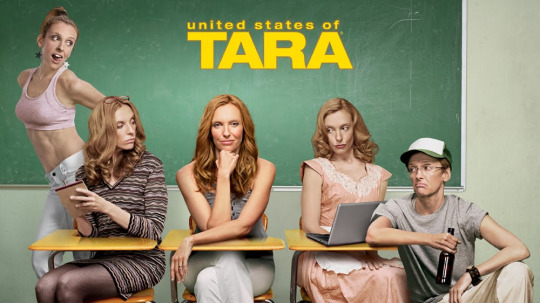
Facts -
Series name: United States of Tara
Run time: 2009 - 2011
Fiction or Nonfiction: Fiction
Was there a diagnosis of DID? Yes, it’s mentioned several points throughout the show that Tara was diagnosed sometime before the show takes place
Was the person with DID presented as evil for having DID? No
Major Trigger warning list:
- Suicide mentions and self harm, and a suicide attempt
- Drug use, smoking, alcohol
- Sexual scenes, exploration of teenage sexuality, underage sex/fetish work(nomexplicit but pretty gross)
- Mentions of varios kinds of abuse, mostly sexual abuse
- Grooming and stalking
- Minor violent scenes
- Emotional abuse, neglect from mentally ill parents
- drowning
- Ableism
- Homophobia
- General dark humor?
- Some pretty explicit language and swearing
- (If there are more trigger, please let me know!)
Subjective Review(this is how I felt about it) -
Personal triggering scale from 1 to 10 (1 being not triggering at all, 10 being a badly overwhelming experience that might cause personal harm): Maybe a 4?
Personal relatability scale from 1 to 10 (1 being unrelatable, 10 being OMG THAT’S ME!): 8
Personal avoidance scale from 1 to 10(1 being eager to get on with it, 10 being impossible to finish): 2, last season is a strong 9(I don’t usually push thru it)
My interpretation of the media(Includes spoilers):
United States of Tara is the trashy DID show and I actually unapologetically love it. If you take it from the perspective that this is a dark comedy with a lot of drama thrown in, I think it’s actually very fun to watch so long as you keep the triggers listed in mind. I know it’s known to be the ~super stigmatizing show~, and maybe it is in some ways we’ll discuss in a moment, but I’m asking you to see it from this perspective: literally everyone in the show sucks. Even the minor characters have some shitty qualities to them, so Tara doesn’t hugely stand out as being evil for having DID. She just happens to have many shitty qualities and her parts reflect that, honestly.
A basic summary: Tara, a mother of two teenagers, struggles through daily life both in normal parent-y ways and in having Dissociative Identity disorder and the effects it has on the people around her. Her husband believes he can fix her. Her son is struggling with discovering his sexuality and complicated attachment, her daughter wants to grow up too quickly and chase after her romanticized dreams. Her sister can’t seem to figure out how to grow up, struggling with her own repressed trauma.
It's a three-season series so I can’t talk too extensively about each episode, so I’ll try to summarize it up by season, mostly focusing on Tara
Season 1 thoughts: On the surface level, right away, it seems like Tara’s alters are used as a gimmick or an excuse. In many ways they are. Heavily stereotyped and a bit ridiculous and as if they don’t have the entire self in mind when they act out. But to me it makes some sense because the amnesiac walls are obviously very high for these alters and they all have opposing views on how they want to live their life. By the people around her, they’re seen as a hassle, a burden, and something everyone wants to get rid of. No one is asking ‘why are you here’(well they are, annoyedly), they’re more asking ‘When are you leaving already?’ The saving grace from this season is probably the proof that suppressing Alters is not how you help them heal, and the therapist makes that very clear as well. The show writers knew what they were doing, I think.
There’s some interesting points of accuracy to my own dissociative experience even in season 1. Buck is ridiculous, but he’s protective in his own right. He has a reason for being the way he is. It especially resonated with me when Tara and Max were setting up to make love, and when Tara lost her nerve, Buck was there to take her place in a protective way.
We see substitute beliefs portrayed in Alice’s episode about wanting to have a baby and believing It to be true. Even the therapist points out what this means and again, Max isn’t listening but the show writers understood what they were doing here.
We see Tara telling people about how DID works time and time again. She has a very up-to-date understanding of her disorder and explains her experiences in such a way that it punches me with accuracy to my own feelings.
What I don’t like about season 1 is all throughout, the characters around her act as if Tara’s disorder isn’t just a burden, but a sacrifice to live around. I think in some part this is due to, yknow.. all the characters being shit. But in the last couple episodes of Season 1, in a DID-specializing psyche ward, the goal of many patients is to fully integrate their alters in a way of ‘getting rid of them’, as if they’re a burden to deal with across the board. I’m warning you on this because while I love United States of Tara, this mindset really snakes its way into my own and plays up a lot of my insecurities about being a burden, especially to my fiancé. : (
Season 2 thoughts: I believe this season boots off after the confrontation with a past abuser and finding..Deeper truths are still stubbornly hidden. Tara gives up and suppresses the Alters once more. Obviously this doesn’t work, though it is seen as ‘everything’s moving smoothly now that I’m pretending the problem doesn’t exist’. It doesn’t last for very long of course.
I like Season 2 a lot. This is the season that Tara and her sister Charmaine are finally coming together to find out the truth and try to heal together. The way the writers handled the weird sisterly bond of growing up in trauma together with both fierce protection and resentment is.. Extremely accurate to how it’s been for me and my siblings. The way that Charmaine gradually goes from calling the alters an excuse to becoming understanding is.. A weird deep healing thing for me. I recommended my also possibly-probably-most likely multiple sibling to watch the show just for those episodes. I think it’s one of the many things I watch the show for comfort though.
There’s also that last scene in the last episode of season 2 where her husband Max, under the altar, declares that he’ll be what each and every part of her needs him to be for them from here out and I just 🥺 I’m sorry, this isn’t really part of the review, but it was a lot like the many loving binding promises words my fiance’s said to me and it made me tear up a little, okay?
As for the DID handling in this season, I’d say it was a good continuation from the first. They really delved into the topic from a knowledgeable perspective and no longer treated the audience like DID is a New and Special thing. I think the ‘burden feelings’ were less for this season as we moved into an actually healing arc. There was nothing fantastical or dramatized that wasn’t already in the first that I can recall.
Season 3. Oh boy. This is known as the horrible and bad season and I have to unfortunately agree. I believe the show was run by someone else at this point, and since there wasn’t a season 4, they had to cram a lot of finished ends where there wasn’t room for them.
I think Bryce is a bit more intense than other persecutor parts I’ve seen in media. I (sort-of) have an abuser introject and with my experience, even at his most intense down moments, the intent for how he behaves is still protective in nature. Can we make the argument with Bryce? Maybe? But I fail to see his protective motives, even if I pull back the layers of ‘these characters are just shit’ and ‘this is written to be an interesting tv show most of all’.
I think what they needed with season 3 was a season 4. More time to actually peel back their own layers and explore what it really means to be a persecutor part. It’s unfortunate that it got cut off so short and the actual answer to healing herself in the end was.. A suicide attempt and literally killing Bryce off. Which as we know, doesn’t work.
I think to cover up for the cut season, there was a lot of misinformation strewn in to the DID presentation. The alters were stripped back to be stereotypes again.
The only good thing from this season was probably the other character’s developments and one of the first episodes having a scene where all the Alters are coming together in co-consciousness.
Overall, I think United States of Tara takes a bit of unneeded flack. As being The Worst Show For DID. I don’t know yet if that’s true. I think a lot of it is down to it being one of those shows where everyone sucks, a bit like Sunny In Philadelphia. There is a lot of stigmatizing trash, sure, but when I take it with a little bit of salt, I come out really enjoying the show.
What they got Right in my opinion:
- No childhood trauma shown explicitly onscreen, no screaming or horror music for switches. You don’t know how much this shit bothers me
- Multiple counts where misconceptions about DID are corrected and talked about openly. They refer to it as Dissociative Identity Disorder. Even if the characters aren’t getting it right, there are many points where a therapist has a stronger understanding of what’s going on(in the first season at least)
- The parts relationships as they come together and the amnesia barriers lower. I’m really partial to Buck and Alice and how they’re shown to have some complexities behind being a part of a system. (I think T has some of this merit too, but they really do her dirty)
- The subtle ways in which trauma effects the characters everyday lives and attachments. Tara struggles to have intimacy, Charmaine struggles to have a stable relationship. All of it is very rooted in trauma responses
- Suppressing your disorder may look like it works for a little bit but it doesn’t, really.
- Handling introjects and substitutes beliefs. Though I think Moon Knight did it a little better, it was nice that they went into this too.
- That the lack of something important from a parent(love, stability, protection, ect) can also cause major trauma
- -They had Gregory and the Hawk start off one of the episodes and I just hold that close to my heart, haha <3
What they got Wrong in my opinion:
- Killing Alters off doesn’t mcfuckin work my dude
- The whole ‘Host is the True Person’ narrative throughout. (Imo, no part is more important than the other, no part is a ‘hassle’ or a ‘burden’.)
- Integration/fusion ‘gets rid’ of parts
- Although they may feel like it, introjects of abusers are not actually abusers and shouldn’t be ‘killed off’ as a means of healing.
- Just…Avoid season 3
Would I recommend this to someone with DID to watch?: Tentatively, yes. There may be more triggers than I listed. I really like the show myself because it’s like the junk food of DID content. Easy to watch and not all that good for you, probably
Just really keep in mind that ‘burdensome’ theme, it might get in your head too.
#united states of tara#DID in media#dissociative identity disorder#dissociative identity disorder media#bunnidid reviews#my last review was written by mr. h so this one may seem a little bit different#also! i watched it all....a short but amount of time ago so i dont remember it all again ;~;
51 notes
·
View notes
Text
The Owl House successed where Gravity Falls failed:
Don't get wrong,this isn't a hate message toward Gravity Falls,I'm not trying to say which show is better and I consider Gravity Falls to be a masterpiece but a flawed one,and I'm going to talk how The Owl House sucessed in which Gravity Falls failed(be civil):
1-Blame Game:In Gravity Falls the narration shown Ford to be the one to blame only, although it is true that he is faulty,so as Stan.
sure he didn't mean to destroy Ford's project but he didn't told him in order to fix it either because he secretly hope that his accident would make Ford stay,he was petty in weirdmaggedon and while Ford is arrogant with messiah complex, Stan is implusive with victim complex and at least Ford TRIES to take responsibilty while stan only did take responsibility when he tries to keep Mabel and Dipper out of this by FAVORITISM and HUMILIATION the fact that he do so after his father the water downed-american-ozai wannable only makes it worse(lets be honest if Dipper was gay,bi or trans everyone in media would scream for blood after seeing Dipper vs Manliness).
Besides,how would you feel if one of your relatives steal your identity,ruin your name and make a mockery out of your life's work?sure he was trying to have enough money to return you but what part of "stealing your name and mock your job" was necessary?even a simple merch shop makes as much money as a tourist trap.
The Owl House on the other hand,Doesn't play "sacepegoat" in Eda and Lilith case,instead it address both of their faults without choosing sides(Lilith for cursing Eda and Eda for letting her insecurities to push everyone away).
2-Protagonist:what makes them hard to write them is that if you are not be careful either they will end up as plot armor or being punished for anything in every turn and Dipper and Mabel examplified it.
Dipper:I get that his character arc pretty much amounts to: "Stop being a pretentious twit, stop trying to act older than you are, enjoy being a kid while you can." The problem is that the show eventually starts beating on Dipper for wanting ANYTHING at all, and that he must always put Mabel first, even if she's in the wrong. The show seems to say that Dipper should take Mabel's approach to life, and although that might make him happier, he's just not Mabel. Instead of learning to pursue his goals in a less reckless way, he is dis-alluded from having goals period, and that can get frustrating to watch,I don't have a sibiling but I do know that pleasing one in sacrifice of your dreams and everything that makes you you is NOT how healthy family relationships works in fact it is toxic.
Mabel:Now now I don't hate Mabel(the only characters in GF that I genuienly hate are Robbie and Pacifica's parents) and I oppose the idea that Mabel should be completely miserable like a CERTAIN AU,but there is no denying that her character suffers lack of change,all her antics is played for laughs only,unlike other characters she never face her consequences and she learns the same repeative lesson and yet never learns(I'm aware of Lost Legends but thats a comic not part of the show so it doesn't change this fatal flaw in the show and even if it was an episode it would still be repeative and only be in "words" not "action").
What makes Luz special?people most of the time forget that it is not her sexuality that makes her unique(sure being the first LGBT Disney protagonist is a big deal but thats just the perk not the character) is that she is balanced between two extrems,not so perfect that it is bland and unrelateable(like rey from sequel trilogy) or only exist to be the punching bag or being idiotic to feel pity(like morty from rick and morty) or despicable(like the protagonist from revenge of nerds who technically committed rape), just human(hence why me a boy who is straight as narrow and is more into sci-fi than fantasy finds her more endearing and relateable than Dipper and Mabel).
3-Ships:The Owl House unlike GF didn't reduce love interests as stereotypical(like Wendy),they didn't made a bigger deal about crushes than it needs to be,didn't fell for tropes(like Pacifica) and take time.
for instance, if you think about it lumity and dipacifica are basically alike except lumity took time,develop,didn't came out of nowhere in one episode and didn't fell for "I hate you but now I love you despite the major differences" cliché trope.
4-The line between friendly tease and humilation:it is true that GF mostly play tease for laughs but sometimes it goes too far.
Take Dipper vs Manliness for example,Stan and Mabel publicaly humiliated Dipper for his insecurities toward masculanity which is just cruel,it is like mocking a tom-boy girl for being too "boyish" and not "girly" enough.
While it is true that Eda and King sometimes mock Luz,I hardly compare those banterings with Stan forcing Dipper into being a furry stripper or giving the ozai treatment to "tough him up" and as I recall Luz and the Blight twins were condemned by the narration for invading Amity's privacy unlike Mabel's invading of privacy.
(Alex once said he didn't mean to make Pacifica's parents look abusive despite the fact that they trained Pacifica to follow the bell LIKE A PET,as much as I admire Alex I sometimes wonder if he underestimates what abuse is)
#gravity falls#the owl house#luz noceda#mabel pines#dipper pines#amity blight#eda clawthorne#lilith clawthorne#stan pines#ford pines#wendy corduroy#pacifica northwest#wendip#dipacifica#lumity#criticism#show critical#critique#criticizes#critical role#alex hirsch#dana terrace
101 notes
·
View notes
Text
rewrite of “gnome alone”
original story is about a young girl, chloe, who has to move places a lot due to her mom’s job. because of that she never really has time to make friends and tries really hard to fit in which makes it into a “better be yourself” narrative... expect it wasn’t done well.
i’m changing that to her no longer trying to fit in or make friends at the start of the movie. she’s a goth in this version (seems like a pointless detail but her style has a role in the story) who pretends she just likes to keep to herself instead of her lack of friends being something pitiful. so while she loves the goth fashion and everything dark, she also use it as an “armor” of sort to keep people away.
her mom tries to be supportive and since she knows those frequent moves and lack of stability in her kid’s life is painful for her, she compensate by treating her like she’s grown and mature. let her do as she wants (buy the clothes she wants, dyes her hair the colors she wants) and trust her home alone. the only problem with that is chloe is left alone too often and while she pretends to be ok with that... well, she’s lonely! won’t let people find out about that tho
SO they move into this old spooky looking house and chloe loves it, up to the ripped wallpaper. one thing looks bad to her: the gnomes. for some reason garden gnomes are left everywhere in the house. weird. while cleaning the place she put them outside for people to take with them. but later they’re mysteriously back into the house.
then she meets liam, a neighbor her own age who came to greet them. one of the biggest problems of the movie is that characters are flat unrelatable caricatures instead of actual people so you don’t get attached and don’t really care when something happen to them. liam is a creepy nerd stereotype done in a way that felt mean.
instead he’ll still be nerdy, and akward, but in a realistic way. he will also be the opposite to chloe: a boy who really wants to be understood and accepted for who he is, and keeps trying to make friends no matter how often he gets rejected. at the beginning of the movie he’ll seems too cheerful and persistant and sorta unpleasant for that reason, until his character arc hits.
so, he welcomes chloe in the neighborhood, and she barely respond, as it’s her thing, but liam doesn’t let that stop him from being friendly. SHE is the one to make a haunted house joke this time around, hoping he’ll leave her alone if scared. alas, as previously stated, he’s the persistant kind. she just ends up closing the door on him. then goes back upstairs to find out what’s up with the moving gnomes, who had, yet again, changed positions.
no more “what’s up with these weird santas” cause 1/ not funny and 2/ you can’t sell to me this teen doesn’t know what a gnome is.
anyway, chloe tries again to throw the gnomes out cause she doesn’t like their vibes (too colorful and kitch) but they, of course, keep coming back. chloe doesn’t try to tell her mom this because she realize it sounds crazy and doesn’t want her mom to loose the image of the mature teen she has of her daughter.
on another day that she’s home alone (after having been to school, not made any friends, liam trying to talk to her and her ignoring him completely) she hears noises around the house. and yes, old houses often make noises, but she’s starting to believe the place really might be haunted, so looks around.
finally she catches two gnomes talking to each other, who force themselves back to stillness when they realize they’ve been spotted. chloe is starting to have fun with this mystery on her hand when the ring bells. would you look at this! it’s liam.
he propose they hang out at his house and play a game or something. his grandma even made cake! chloe says no of course. when liam ask what she’s doing, she just says it cash “trying to catch gnomes alive”. liam is silent for a moment and chloe expect him to find her crazy and leave for good, but he smiles and ask if she needs help instead.
(will finish later)
7 notes
·
View notes
Text
It’s been a few days since I watched Turning Red, but I can no longer hold these thoughts inside my body, so I might as well say it on the Internet.
Click the “Read More” to read a very long winded essay post about how this movie is the first girl-focused teen coming-of-age movie that I really really like. Spoilers below.
When I first saw the trailers for Turning Red, I was both excited and afraid. I was excited because the animation looked super good, the premise sounded interesting, and I liked that it was going to portray a background (Asian-Canadian) that I was/am not familiar with in a time period that I lived through when I was very very young.
I was scared because I hate teen coming-of-age stories. Especially ones that focus on “girl” puberty and adolescence.
I’m a transgender man. I hated teen girl stories all my life, and it was only after coming out that I realized why: Any and all coming of age stories from my past typically followed really trope-y gender and sexuality stereotypes, most (if not all) of which made me feel othered and alone. They reinforced this idea that teen girls and boys have specific, rigid experiences that hardly overlap, and that when you become a teen, your relationship with the other gender (because of course there are only two in these stories) will forever change. If you are a girl, you can not return to the time in your life when you can just befriend a boy, and vice versa.
This made me especially spiteful towards stories about and aimed for teen girls. Either the stories were entirely unrelatable, and I spent my time reading/watching them being annoyed and confused, or there were aspects of the stories that I could potentially relate to, but they were IMMEDIATELY undercut with the INSISTENCE that these were female experiences, and that no body other than girls could truly understand them, which made me furious and dysphoric.
So once it was clear that Turning Red was about puberty and focused on a 13 year old girl, I couldn’t help but be afraid that I’d experience these spiteful, dysphoric feelings all over again.
I LOVE Turning Red.
By the end of the movie, I was immediately examining my feelings to pinpoint how this movie succeeded where others failed miserably. They mention periods, for god’s sake, a topic that typically makes me so physically uncomfortable and dysphoric that I want to shrivel up and die whenever it’s brought up in media. But I was able to watch this movie, laugh and be appreciative that the movie was normalizing a natural process, and only cringe at the scene that was SUPPOSED to be embarrassing.
I think Turning Red did a great job at portraying a girl’s coming-of-age story that other people can still relate to.
Meilin has a scene where she crushes on someone and draws anime-inspired sketches in her notebook. Is this something that people associate with teen girls? Yes.
Does the movie insist that this is a girl thing and that only girls do this? No. The most you could argue is that it implies this through not showing a boy doing it, but I actually think it’s fine as is.
(This is also a scene I heavily related to, as I drew fictional characters I crushed on in pseudo-anime styles in high school. The process of her doing it and her facial expressions NAILED those feelings.)
Meilin and her friends, who are girls, love the boy band 4*Town and crush on the members. Is this a thing that people associate with teen girls? Definitely.
Does the movie insist this is a girl thing and that only girls do this? NO. Not only does the concert have boys in the audience, Tyler is present and quickly accepted into Mei’s friend group as a 4*Towner. He is not mocked or othered for this interest, and 4*Town’s music is legit awesome enough that any audience member would feel justified in liking the music.
SPEAKING OF TYLER!
Tyler is a 13 year old boy who is the closest thing that Meilin has to a bully, but is honestly just a bratty teen boy who likes messing with her and teasing her. Is it true that Mei’s main male classmate has negative interactions with her? Yes.
Does the movie blame this on Tyler being a boy and insist that this is a natural boy/girl dynamic? NO. I argue that it gives enough subtext to show how this is a personal Tyler problem and not a boy problem. Like Mei says, Tyler is an insecure jerkwad at the start, insecure being the operative word. He wants Mei at the party so people will show up, implying that he doesn’t really have friends, which is supported by the audience not seeing him interact with other classmates. He quickly accepts the idea of paying $200 for Mei showing up, and he has a big cool-looking house, which implies that his family has a lot of money. (Also, he’s able to attend the 4*Town concert, which means his parents were willing to fork over the ticket money and just apparently leave him there with little supervision) My head canon is that Tyler is somewhat of a spoiled brat of a boy who needed to work on his personality and feelings of insecurity before being able to make friends, and having the music of 4*Town to bond over was the starting point he needed to connect with others.
I could go on and on, but my main point is this: while the movie picks a few things that can be seen as tropey girl stuff (liking boy bands, thinking boys are cute, drawing anime drawings, etc), they don’t reinforce that restrictive girl vs. boy dynamic that just infected all previous teen stories I had to experience in my life. These are all things that these teen girls just happen to like/do, but they aren’t insisting that ALL or ONLY girls do this.
Perhaps it’s more of a vibe thing, but those are the vibes I got, and I loved it. I did not, at any point, feel ashamed for relating to the things these fictional girls did, which is huge for me.
Also, I feel that Mei’s panda does not only represent female puberty. It’s a metaphor that, specific to the story, is a female puberty (the panda blessing is passed from daughter to daughter), but any non-fictional audience member could relate to it.
People keep saying the panda “represents periods”, but that’s not true. It CAN represent periods, but even then, it doesn’t ONLY represent periods. Honestly, the panda more personifies growth spurts, body odor, heightened aggression/panic/sadness, new levels of physical strength, feeling like the biggest and most obvious presence in a public space that could draw tons of attention to yourself...
... THOSE ARE ACTUAL UNIVERSAL PUBERTY EXPERIENCES.
Sure, there could still be people out there who don’t experience some of these aspects. But these are aspects that apply to the puberties of far more people than just girls.
I actually have an original character that I created back in high school. He was one of three characters, and they each personified different parts of my brain. This character was made of my anger, my lust, the feeling that I was an obvious presence that people could dismiss as overgrown and disgusting... but he wasn’t a negative character to me. He also had the anger that believed I deserved to be treated with respect. He appreciated and loved the small, sensitive, sad side of me. I related to him and singled him out, but did not know how to define him.
Now more than anything, I think he’s my panda.
(Or not a red panda, since I’m not Chinese. Maybe my mom could pass on an Ecuadorian animal blessing. Like a Pampas cat. Yeeeeesssss.)
The true beauty of Turning Red is that while you can totally view it as a story of a teen girl’s puberty, and teen girls can relate to it, I think that anyone can relate it. I know there are a ton of hot takes out there that “oh boo hoo, the cismen are saying they can’t relate to characters who are different than them”, but my take goes beyond that by insisting that you honestly don’t need to do that much work to relate to it.
If this insecure, dysphoric transman can totally love and relate to this story, then it says a lot about how universal it can be.
P.S. I also heavily related to the generational trauma aspects. There were definitely differences between Mei’s Asian mother and my Ecuadorian mom, but god damn, there were still moments that yeeted my consciousness back to being a teen who was worried that I was betraying my mother by questioning her and being embarrassed by her. Encanto and Turning Red felt like two puzzle pieces of relatability in that regard.
12 notes
·
View notes
Text
Who is the Rob Liefeld of comics writing?
I remember reading somewhere in an essay called ‘Throwing the Book at Cartoonists’ where somebody said that there seems to be a low standard of writing for comics, which makes me think while there is a standard for writing in comics in the Anglophone world it’s almost always judged in terms of not just keeping characterisation consistent but also a weird obsession with continuity.
This might not be unique to superhero fans, but I actually don’t get the fascination with continuity. Even in my big comics reading days, I didn’t care much about continuity. It seems the ability to merely tell a good story is often made to be judged in the context of whether if it fits continuity, I don’t know but it seems when it comes to being able to tell a story continuity gets brought up a lot.
Not to mention that in DC and Marvel, there’s a tendency to cram too many speech balloons in a few panels where it suffocates the pages and don’t allow more panels to time the dialogue with. Let’s not forget there’s this person who really has difficulty getting into superhero comics said that there’s a tendency to make the characters’ speech sound rather unnatural.
I feel this is what you get from learning to write from only superhero comics and not paying attention to human speech, not even reading interviews (which are oftentimes transcribed in due time). I cynically think mostly reading fiction, especially if it’s not read in tandem with reading nonfiction and taking a lot of observation from real life, can result in very artificial characters and dialogue.
I guess in order to come up with a Rob Liefeld of comics writing, it wouldn’t just have grammatical mistakes but also so convoluted, artificial and horrible that you’d have to wonder how on earth did it even get published. It seems for some people, there’s a tendency to judge bad writing in terms of one’s political affiliation not if they’re actually bad. (I think these people actually have rather low standards.)
If we’re going to judge comics by the way they time their dialogues with the panels and if they sound natural, I feel for DC and Marvel they’ll fail big time with all these unnecessary speech balloons in just a few panels. The Escher Girls of writing would involve writing female characters in ways that are misogynistic and not relatable to women.
Then comes the racist stereotyping and the like, which means realising it’s not racist but also unrelatable to other ethnicities. That’s going to involve a higher standard of writing than most are used to, if because that involves portraying people as people. Neither entirely good nor bad, but still relatable to the people you’re trying to portray.
Seems like when it comes to constituting who’d be the Rob Liefeld of comics writing, you’d have to have higher standards for comics writing than is shown and appreciated in its current form.
2 notes
·
View notes
Text
Is Lady!whump Misogynist?
So I logged into this account to see that the discourse of the hour is “whether or not lady!whump is misogynist”. As a lady and a whumper, I think my conclusion on that matter is predictable, but I just wanted to offer a bit of reasoning as to why I think lady!whump is not misogynist.
In order to explain in depth I have to go back in time pretty far, in fact, all the way to the time of Shakespeare. At that time, by the way, “whether women have souls” was a question very much open for public discussion.
At that time a lot of literature and romances by both men and women was focused on proving that women actually do have feelings that are both as deep and complex as men’s. See Shakespeare’s female characters, whose romantic interest in men often drives the plot, as opposed to being only the other way around, which was standard at the time. In fact, the Twelfth Night is a great example of this, as Viola has to disguise herself as a man to get close to her true love and be able to discuss with him the fact that women can have feelings just as much as men do.
This seemed to sink in, and by the time we get to the 19th century people are all about that delicate feminine sensibility, in fact it’s already a bit of a cliche. We’ve gone from “do women have feelings?” to “women have way more feelings than men, and it’s gross”. Because there was still prevalent misogyny, of course, acknowledging that women have feelings meant feelings were increasingly being considered feminine, but women’s feelings were also silly and sentimental, and women were simply too delicate, they could perhaps perish of a strong emotion. What we might think of as lady!whump was actually pretty common at this time but it was also considered cliched even then because it was always pure girls too good for this world dying tragically. Sometimes I have to go back this far to read any good lady!whump (though only the ones written by women are any good) because of what happened after that. 2nd wave feminism hit around the 1960′s and the already somewhat tired, disliked damsel in distress tropes fell into HARD scorn. Feelings = feminine and feminine = weak. And weakness is bad. After all, a woman showing weakness validates the old sexist stereotypes about women. Therefore women in fiction are not to be vulnerable, or have silly old FEELINGS because we’re STRONG, like MEN. Right around this time we have the birth of the female action hero. The female action hero is empowered and sexy. She’s not happy, but she’s not allowed to be sad either. She’s always on top of everything. If she can’t talk her way out of a situation she knocks the bad men out with her four inch heels. If she’s ever captured she’s not allowed to show fear, if she’s hurt she’s not allowed to show pain, and she never needs someone else to rescue her-- she’s about to break out of her bonds and kick ass. She was never in distress, she was capable of escaping the entire time. If someone asks about her wounds, she scoffs-- she doesn’t need their pity.
She’s also completely unrelatable. I know it’s been said that women suffer enough in real life, and fiction is glorifying violence against women or something like that. I can see instances where the death and suffering of women is used primarily for shock value. I’ve always found those extremely unsatisfying. The difference, I think, is that whump, specifically, uses suffering to serve the character, rather than to serve only the plot. When the suffering of women is used to serve only the plot I find it utterly uninteresting. When it’s used to serve the character it’s humanizing and relatable.
Even when I was a child and not aware of tropes, I noticed that even the most distressed damsels were never portrayed as a man would be in the same situation. We’re never locked in the tower with her, we’re on the outside looking in. A woman’s death is used to show off how dangerous the monster of the week is-- and that’s fine on occasion, because the monster has to kill somebody, 50/50 chance. But does a woman get an obi-wan moment? Are women applauded for their courage in the face of fear? Can they crumble and be rebuilt without being faulted by the narrative for weakness? Is this you? Not a hypothetical ideal invulnerable fearless you, but the real you.
I think lady!whump is important for a couple of reasons.
1. When men suffer and die in fiction they often do so nobly, admirably and for their own character development. Lady!whump allows women to have the same opportunity to see themselves this way in fiction.
2. If women suffer, they are allowed to want to be comforted. I’m allowed to want to be comforted. Maybe Scarlett Johansson doesn’t want your pity, but I am not Scarlett Johansson. The Strong(tm) Woman(tm) is not even my role model. It’s precisely because women are hurt in real life that we need lady!whump that allows women to see themselves in fully realized, vulnerable characters capable of strength but also in need of comfort. ~
#ftr Karen Page meets all my standards for female characters#whump#lady!whump#meta#ladywhump#whump meta
58 notes
·
View notes
Text
Emily in Paris is tres terrible
If for some reason you decided to check out the new Netflix show Emily In Paris, DON’T. Go watch The Devil Wears Prada instead. It’s practically the same thing, only in the latter you actually get good performances and character depth.
Coming into this show I was expecting a cute heart-warming story. 10 minutes in I thought how great it would be to watch a show about a woman figuring out herself and her work life in a new country. And then all my hopes went down the steaming bidet once Gabriel opened his door.
Emily in Paris truly tested my gag reflex, and here’s why.
First of all, the premise of somebody going to Paris – “a perfect romantic city” – is so overused and unrealistic. Paris sure is pretty but it’s also dirty, polluted, and has more than 29 thousand people sleeping in the streets. But of course Emily lives in some parallel universe where Paris is apparently Paradise. Idolization of anything, even a city is harmful. So this “perfect” Paris is not apreciated.
The Instagram followers ridiculousness. There’re actual people whose job is to promote Instagram accounts, you don’t become an influencer overnight by posting a pic of you eating un pain au chocolat (which is just bread with chocolate, stop creaming your pants, Emily).
On top of that, the abundance of French stereotypes is exhausting. Too hard to write complex characters and present actual reasoning for their actions? Don’t bother, just put every French cliche you’ve ever heard of.
And that chambre de bonne is just ridiculous. Who knew that maids used to have such big apartments? (By the way, you can see a more realistic room that you could get in Paris in the movie Monte Carlo. Ah, such a good movie.) The creators were going for an aesthetic, thus missed an opportunity to show Emily struggling to adjust to her new life. It’s quite impossible to believe that Emily’s going through a rough time when her life is seemingly perfect, and any inconvenience doesn’t affect her at all.
The ex. It’s very typical to introduce a romantic partner of the protagonist at the start of your story and not give them enough depth, so that the audience doesn’t get attached to them and the inevitable break up brings relief. Now they can root for the protagonist to get together with the planned love interest. Yay.
However, this structure might work for a movie, but when you have 10 episodes to flash out your story and therefore the protagonist, wouldn’t it be better to use this opportunity to develop the secondary characters? Not for their own sake but to develop the main character through them.
Every character you spend some time on should play some important role, right? Otherwise why should we bother watching their scenes. Shouldn’t the current boyfriend of the main lead tell us something about the protagonist? Like, why did the main character choose to be in this relationship, what do they see in their partner and therefore what qualities do they value in people? How do they act in personal relationships? What role does their partner play in their life?
The main character is dull and unrelatable with zero character development. A conventionally attractive privileged white woman whose biggest struggle to overcome is her coworkers not being nice to her straight away. We’re constantly told that it’s hard for Emily to adjust but it’s never shown. In fact everything solves itself rather smoothly, carrying no repercussions for her.
With such an unlikable selfish protagonist you find yourself more interested in secondary characters. It actually feels like we get to know Mindy and Camille more. Compared to them, we know nothing about Emily’s family relationships or literally any backstory on her. Who is Emily? Why are we following her? Why should we care? What is her inner conflict? Oh right, she has none. Because by the end of the show she stays the same exact character that we met in the beginning. If Emily’s experience does not influence her at all, why should it matter to the audience? And what is the point of telling this story?
Feminism: the lost potential [episode 3]. “Non, Antoine. Sexism isn’t sexy. Shut the f*ck up.” That’d be enough for me from such a bland show. But no, we’re left with an ambiguous conclusion, when Emily doesn’t disagree with Antoine’s perception that women enjoy men’s unsolicited attention. And then this topic is not discussed again. Thanks for that, Emily in Paris. How about next time (which will hopefully never happen) you either have the bravery to actually speak on the issue and educate people or at least do not cause more damage.
Finally, the most annoying plotline that decidedly ruined the show. Did you ever watch a movie, and there’s a couple that you love, but you feel like something’s missing? So, you just think “I wish some cheating was involved”. If you actually do think that sometimes, media content has tricked you into thinking that cheating is sexy and exciting, when it’s actually destructive and disgusting. THE CHEATING. Stop normalizing it!!! Enough. It always takes away from a relationship. And we’re tired of seeing it. Give us some healthy couples. And if you think they’re boring, you just don’t know how to write them. If you get rid of the cheating plotline, the show becomes slightly bearable. It’s still boring and irritating, but at least it’s not as problematic.
Anyway. Similarly, to how “Enola Holmes” should’ve been a series, this show should’ve been a movie. There was no point of dragging out this – I want to say – story. Because nothing happened. Was there a big revelation in the finale, that we were led up to? No. Did Emily learn anything thanks to her “journey”? Nope. Was it just 5 hours of her hooking up with unremarkable men who all look the same, while being a terribly arrogant person? You decide.
#emily in paris#tv show review#tv show rant#netflix tv shows#netflix emily in paris#worst tv show#shows i hate
8 notes
·
View notes
Text
Robin - The first Miniseries - Issue #1 Review - What makes it, and Tim Drake work? (R.I.P Tom Lyle)
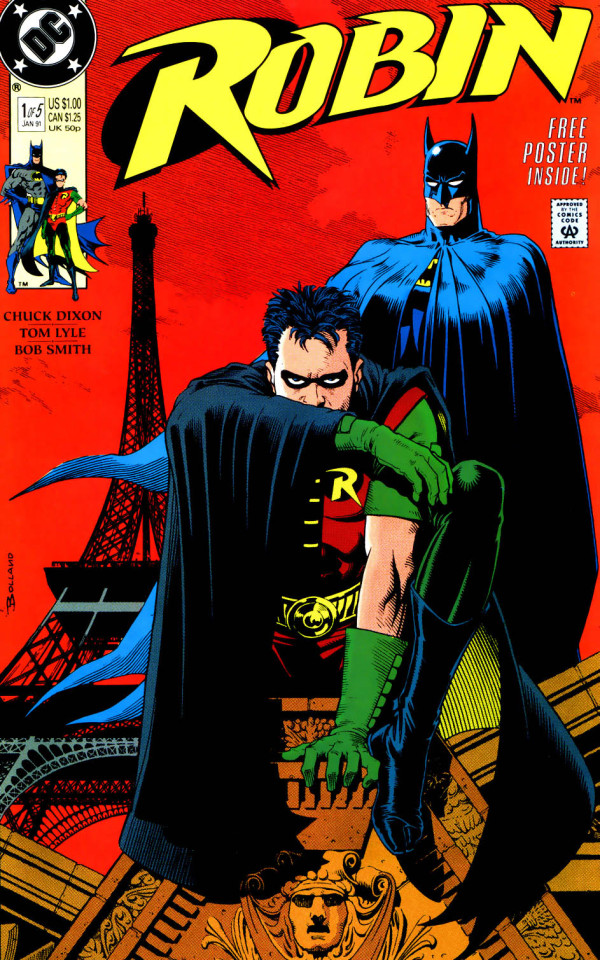
One thing that I’ve adored about Tim Drake since I first started reading him. Was how he wasn’t even close to a typical superhero.

He wasn’t handsome (well, gets called cute, but that’s different), he wasn’t confident, he didn’t always know what to do, he wasn’t what you’d consider super cool, he just wasn’t. He was Timmy Drake, he was a scared, anxious, geeky, kid, and the first Robin miniseries that came out in 1991 showed exactly who Tim was. It showed exactly who he was straight from the first page of the comic.
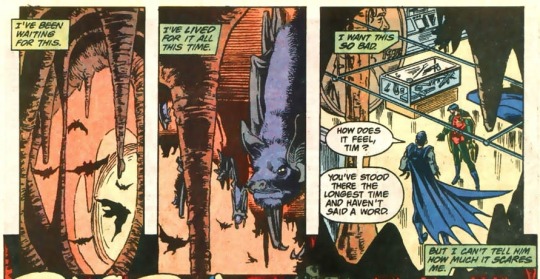
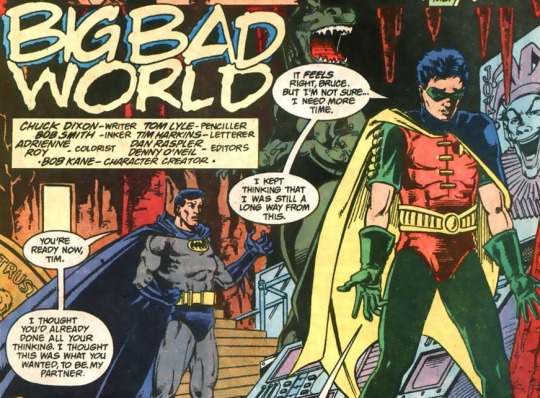
When I read a comic, I absolutely love it, when the main character is a strong character. Not physically, or mentally strong, but when they’re just so there, that they feel like a real person (not in a delusional way, just a fleshed out way), it’s when reading a character is at it’s best, because it feels the most alive.
I felt like Timmy was a real dweeb of a kid, caught in an astounding situation when I read it. When a character is strong in the way Tim’s character is strongly written, it’s easier to get sucked into the adventure. Even though the adventure may be unrelatable, when the character is grounded and real enough, it helps make the adventure feel real. Much like how, despite Indiana Jones collected typically religious items and seeing fantastical things, it still feels grounded most of the time to keep it from feeling straight up silly all the time, because Indiana Jones himself is grounded.
Tim’s an incredibly good protagonist in almost every way you can want a protagonist to be, besides not being close to a typical action lead. He carries the story, his personality is strong (even if it’s not loud and bombastic), and you want him to succeed is.

He’s a sheltered geek that’s been put out into a world he barely knows anything about, so he can learn to be a hero, before he even feels he’s ready, but even when it’s clearly getting to him. He’s not going to let it get in the way of getting better.

Tim’s awkward, out of his element, confused, scared. He has no clue what he’s doing even in social situations given the fact he’s in France during this story and doesn’t know anyone. All he can really do is his best, and try to stand back up after being knocked down onto his butt constantly, and stand up for what he thinks is right.

Some people consider Tim boring, and it’s one of those things I don’t really understand too well. They’re one hundred percent free to disagree, it’s a matter of tastes in the end, but I assume it comes from how Tim isn’t the typical superhero when people read for a superhero. He isn’t Batman, he isn’t the Flash, he isn’t Superman. He’s more Spider-Man if anything else, because as his character developed during the miniseries, he became strong enough to hold his own ongoing series even if he isn’t like most other superheroes, in-fact he’s just a superhero’s sidekick.
That Robin ongoing series would be the longest running teenage superhero comic in DC history only beat out by Clark Kent as Superboy.
This doesn’t mean the first miniseries is perfect though. It has it’s downfalls like being too uneventful in it’s first issue, but for the first miniseries to star any Robin as Robin, it’s great because it’s great for the character.
It took what Robin was meant to be all the way back in the 40s, but took it to be something more complex for a modern audience. Making Tim genuinely the best Robin as Robin in my opinion, as far as serving the purpose of the title, and still being great on their own separate to Batman, because Tim made Robin a solo hero as much as Robin was a sidekick.

If Justice League was the Queens and King’s of DC, Tim as Robin was the freaking Prince of DC during the 90s, because he even got to have an 80 page giant during then, something reserved for the biggest heroes. He was that popular when writers still cared enough to actually write him as himself, and not change him into their ideal.
So while I’m totally overhyping this, I’m just explaining how cool Tim used to be back in the days of better writing, because I think it’s something forgotten at this point for the most part.
His first miniseries though, was totally low-key, just to say it since I overhyped it people might expect a blockbuster, but it’s not like that. It’s low to the ground. It wasn’t Superman fighting off an alien invasion, it’s Spider-Man. It’s a scared boy in a situation that should be handled by a brave, heroic man, but the scared boy has a big enough heart and enough taught skill that he feels he has to be the one to save the day if no one else will.
It’s about Tim as a character more than it is the typical super-heroics.
--
The series is set up really well to let you know who Tim is. It fleshes Tim out as a character even if it is relatively low-key compared to a bombastic sci fi character or warrior of some level.
They show you how he feels with him being scared. They give him a sense of being real by showing his anxiety, and they show you some of his motivation and sadness. They open Tim up to be vulnerable quite often to the reader.

Tim compared to other heroes, is a more emotionally vulnerable person. It allows him to stick out from more emotionally constipated or emotionally open characters. He’s open to the reader, but he’s still learning who he is. So a lot of it’s kept in side as he struggles to process the situation he’s being put through.
As far the things most heroes have that makes them a good hero. Tim doesn’t have that. He’s been established as a computer geek that has no idea what he’s doing.

When it comes to Robin. Practically every other Robin was a natural. That wasn’t the case for Tim. There’s a misconception that Tim was a Gary Stu, but he’s genuinely not. He gets the crap beat out of him a lot in this miniseries by just about anyone.
They do a good job in the miniseries, by remembering to put Tim in different situations to help him be fleshed out. To give the reader a good idea of who this kid is as you read him. The reader knows who Tim Drake is when they see him get the crap beat out of him. It lets people be attached to him and feel something when he’s down on his luck and not doing good. It makes him sympathetic in a way that isn’t forced, because you expect the main character to be beat up, but when you know what the main character is like, it’s closer to seeing a friend be beat up than a character you feel nothing towards, because you don’t know them.


One thing about Tom Lyle’s art that I think really helped the miniseries, is that it’s super obvious that Tim’s a little kid. At least as long as you ignore the stereotypical 90s buff art style. He’s incredibly babyfaced even for his own age, and shorter than every character but ‘the girl’ (because of course the girl has to be shorter. It personally bugs me, but it’s how it is in this). He’s a small kid, even if the typical 90s styled buff art doesn’t make it obvious at first. Every character besides the girl characters all are noticeably taller than him. And while he’s clearly a very serious kid trying to be what he feels he needs to be, and is mature, there’s still these inherent kid-isms in him, because no matter how hard he tries not to be he’s truly just a kid in the end.
He’s a pipsqueak.
So far in the first issue as far as I’ve shown. It shows about all the reasons why Tim doesn’t seem to be a good hero. He’s scared, anxious, emotionally slow to process things, out of his element, geeky, he doesn’t even seem to like girls like the typical action lead, but by the end of the first issue, they remember to show you why he is a hero in the first place.

Because he stands up for people. When there’s a situation that’s bad, he can’t help but jump in. He’s socially awkward in quite a few situations, but when it comes to standing up to someone being gruesome as a person or even just a simple bully, he’ll get out of his element if it means he can help. Tim doesn’t back down from them if he can help it.
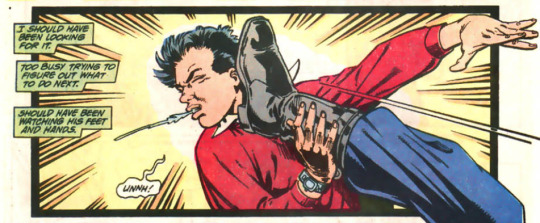
Not that he’s good at this.

Like at all.
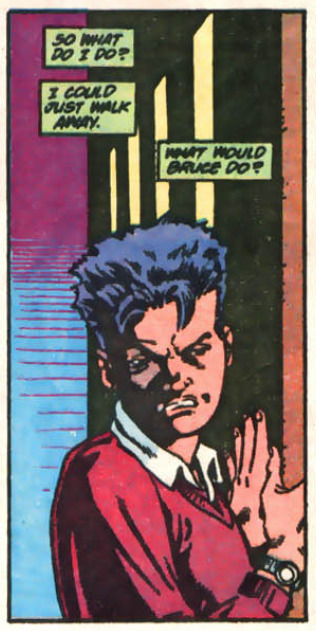
But Tim’s constantly trying to do his best. Between his massive heart and not wanting to let Bruce down. He keeps getting back up, and is constantly trying to do better.
He did not intend to be Robin when he found Dick Grayson, but when he feels he has to do something. He does something. Much like how he felt he had to be Robin because someone had to be. When a bully is there and no one else will do anything. He steps in. Even if those bullies are actually thugs, and it becomes a Robin situation.
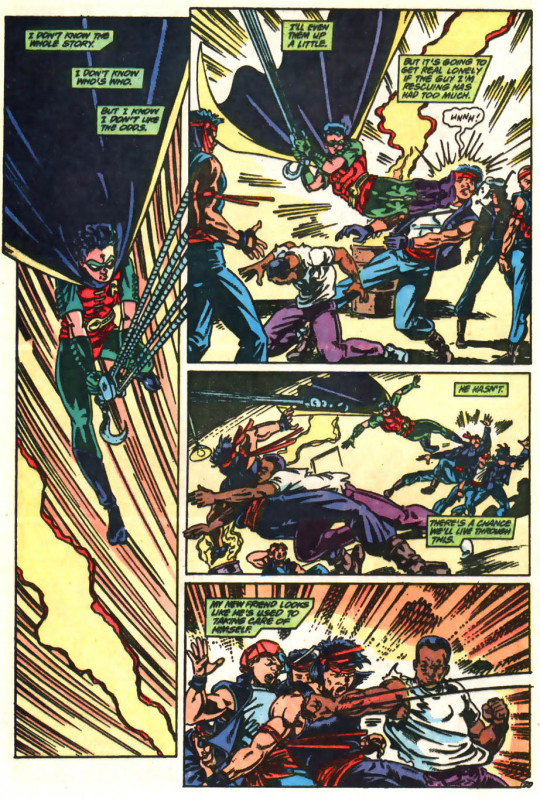
It’s almost like he can’t help himself but save people. He can’t help but be a hero no matter who it is. If it’s a French girl getting smacked by her boyfriend, he’ll help. If it’s a a fully grown American man being beat up by a gang, who he doesn’t even know, let alone what’s going on, he’ll still help.
He tries so hard to help constantly. His little heart can’t help but leap in and help.
--
Just in the first issue. They make sure to let you know that this Robin isn’t just a one note character. He isn’t a nothing happy go lucky kind of pun-filled kid, but he fulfills what a Robin’s supposed to be. He’s a real person, not a stereotype of a sidekick.
Tim might constantly be down on his luck, he may have his butt kicked constantly, he may make mistakes, he may be awkward, he may be a total geek, but he’s still a hero, he’s still idealistic and hopeful, and does his best to make things better before he leaves.
He’s a character, who while he isn’t a typical hero, he has the spirit of a hero deep inside of him, and it’s what helps hold him together. He’s such a fully fleshed out character by the end of his first solo issue compared to how less successful characters are this early. Not that he didn’t have time to become more realized before, but they show you why he is the main character, why you should care and feel for him, and why even despite his dweebie kid-ish-ness, he is the hero.
He gets his butt kicked, but he gets back up to try again.
The character is a kid you can’t help but root for when you pay attention to him.
This miniseries isn’t so much of a grand super hero tale of thrills and constant explosions and excitement, as much as it is a simple character study, of a little geeky boy sheltered in boarding schools that had such a big heart that he became a superhero.
So maybe my fascination with Tim Drake as a character is why I adore this little low-key miniseries so much.
I feel if you’re looking for a typical superhero epic, you will hate this miniseries, but if you love characters first and full-most when reading something, and you have a soft spot for tiny, baby-faced, (mostly) soft spoken dweebs doing their best. You’ll probably love this Robin miniseries if you pay attention to it
The first issue alone, while mostly uneventful plot-wise (which does cause it to drag a bit) is pretty much Tim’s character shown through different scenarios to let you know who he is. Which even then it is great as it works in a similar way to a movie’s three act structure.
However, that doesn’t mean there’s no excitement at all in this miniseries-
It comes next.
184 notes
·
View notes
Text
Princess of Dorsa, by Elizabeth Andrews, Ch. 3 & 4
Tasia could have had him put to death with a few words if she'd wanted to, and surely he knew it. He had to be wondering if she still would. But she didn't plan on doing that. Just as she'd learned that it was useful to have some allies at the Sunfall Gate, she might eventually find a use for a city guardsman who owed her a favour, too.
Since when being sexually assaulted by someone means that they owe you a favour? That would imply that the sexual assault itself was a "favour", a good thing. It is not as if she gave him some bread from her basket, he commited a crime against her. The fact that she equates that to "owing her a favour" is disgusting and makes light of the whole situation. He acted like somebody that had done it before, and I have no problem imagining a character like him doing it again, seeing as he got away with doing it to the princess herself.
That "Servant of the Empire before servant of my desire" thing surely lasted long. Where is your duty to the female population of the Empire, Tasia? For being a "servant of the Empire" you surely don't think about your people's safety at all.
They reach the Emperor's office and we get a description of the Emperor. He does not ressemble Tasia at all and it makes me call their blood line into question. Tasia looks like her incredibly beautiful, conveniently dead mother and nothing like her father, who is of course tall, fierce-looking and intimidating. I have the feeling I have read this exact lines a thousand times before. "My mum was the beauty and my father was the beast, and I look like my mum" is really, really trite. The father could be handsome as well (and to have a charismatic personality, or some personality that wasn't of the "cold-hearted ogre" variety), the mother could be the fierce and intimidating one or maybe they both could be normal looking. But god forbid that we have a princess that is anything but gorgeous and hot in a dainty way, and whose mother is alive.
In this scene Cole of Easthook gets introduced. He's a guard and one of her father's advisors, and will probably be important. He is always described as sneaky and cat-like so I guess he is up to no good.
The wannabe rapist guard and Tasia explain the situation to the Emperor. Tasia omits the fact that she was visiting a man at night, which her father says out loud for her instead. Real classy. I am sure that mocking her for this in front of several guards, one of them a city guard, won't damage her reputation at all, especially in this medieval (?) and mysoginistic society. It also makes his character look like a petty asshole, but I digress.
"I don't need your false promises," said the Emperor. "But tonight is the end of your foolishness, even if I have to lock you in your quarters each night and hang any guard who lets you out."
Dude, I am pretty sure you used the word "again" when you talked about how Tasia was visiting Markas. The book mentions at various points that everyone who lives in the palace and their mother know that Tasia has several male lovers that she visits frequently and has been doing so for months, if not years. Hell, several characters mention it explicitly on their dialogue. You have known for a long time and you haven't done jack, so excuse me if I think this is bullshit. You have not even bothered enough to change the guard's shifts, which would be a way better solution that killing capable men at your service.
After they arrange for a questioning of the assassin, every guard except Cole leaves and the Emperor starts to berate Tasia again for not being a proper princess and almost leaving him without a blood heir. Tasia reminds him that he has another daughter, to which the Emperor replies:
"Adela is a twelve year old who prefers ponies and pageantries to politics."
1) She is a child, you leave her alone. 2) pageantries ARE related to politics, unless you're thinking about beauty pageants, which it is what the author seems to be referring to. I am not an english native, but 5 minutes of research have shown me that pageantries used to mean ceremonies, some of which had political meaning (inauguration ceremonies and the like). Also, ponies and pageantries seem like very... Modern definitions of a little girl's "feminine" interests. This author seems to have taken Disney films as an accurate portrayal of medieval femininity, as the protagonist's mother was always singing with birds in the morning while they followed her across the garden. It is very cheesy.
Her father proceeds to throw verbal abuse at Tasia and to call her stupid with very long sentences. After that he proceeds to call his dead 13 year-old dead son "weak" and incapable, which makes me agree with Tasia: he doesn't care about his children at all.
"You think you know so much," the Emperor said. "But your actions reveal that you are hardly more than a child. A foolish child, at that, who nearly got herself killed tonight. For nothing."
Well, that's true.
"If two city guardsmen know that the Princess was found leaving the Ambassador's Quarter before dawn, it won't be long before word spreads and people begin to talk. I cannot wait any longer, Tasia. It's time you accept a husband."
You sure helped, saying out loud that your daughter was visiting a man at night in front of several guards. Also, this is a moot point, since we know that she won't have to be forced to take a husband for plot reasons. It creates no tension whatsoever and it doesn't tell us anything about the characters that we didn't know. The Emperor and Cole talk about getting a bodyguard for Tasia, which they should have a long time ago. Tasia says that it would be improper for a man to be with her at every hour (just give her a woman guard). After some back and forth, there is a scene between Tasia and her father that is supposed to be heartwarming, and it kind of is but I'm not entirely convinced, mostly because there are limits to how big of an asshole you can be to someone while still caring for them. Her father tells her that he felt the same at her age, that he didn't like to be the heir, but Tasia reminds him that their situations are different since she will never be able to rule in her own right; she will always have to depend on her husband's approval, and the Emperor reminds her that some women have been named Empresses in the past. That bit was pretty nice until:
Tasia scoffed. "One Empress who was named her father's heir. in the thousand-year history of the house of Dorsa."
This and other dialogue imply that the Empire has been standing for those thousand years. This is possible, but makes me curious about how did they resist for so long when they seem to have been in the verge of destruction for a while.
Father and daughter say goodnight to each other and we go to chapter 4.
I wish we got more descriptions of the scenery, because the author gives us no clue about how everything looks. The descriptions are scarce and bland; they don't leave any particular impression on me.
Mylla is introduced; she's a noble of a minor house and Tasia's handmaid. She's younger than her and quite loyal, as she waits for her and has been worrying about her wellbeing all night. They are lovers, and even though Tasia knows that she should not tell her certain things, she can't have secrets with her. They make out and have some sweet moments, like this one:
Tasia closed her eyes, letting the darkness become complete, disappearing for a sweet moment into a world where there was no Empire, no Markas, no assassin, no Cole, no Father, no Mack or Dawkin or Grizzle. Disappearing into the world which contained only her - her and Mylla.
The world where she wanted to live forever.
Awww. I still don't like Tasia but this was cute.
Mylla also berates Tasia; she doesn't like that she chose to stay the night with Markas instead of with her and asks her why she did it, and then we get this:
Because you would choose Markas over me, if given the chance, Tasia thought bitterly.
Well, I'm not shipping this. It does make Tasia more interesting, however. So far I took everything she did at face value, and didn't think that she could have hidden intentions when she was sleeping with Markas, apart from being obviously attracted to him. The fact that she slept with him to keep him focused on her and not Mylla gives her actions more nuance and show us that she can be good at manipulating situations (even when it is sad to have to manipulate a situation like that).
Tasia worries that maybe, the only reason that Mylla sleeps with her is because she's the princess, instead of because she is attracted to her. Tasia seems to be in love with Mylla, but to be honest, I don't get the feeling that the other girl is that special from the way she talks about her. With Markas, you understood how she felt without Tasia having to state it directly: she found him boring but still slept with him because she liked his abs, and that was all there was to it. Mylla just feels like an extra who the princess happens to be in love with. I don't like to be told about things, I want the characters to make me feel things. I want to feel how Tasia is pinning after this woman, how her heart beats when she hears her laugh, how she has to bottle up her bitterness every time they talk about their male lovers. While her infatuation with Mylla is a useful tool to explore her bisexuality and attraction to women, Mylla herself is just another minor character at the moment, and gets treated as such. She does not even feel like a character as much as she feels like a set of stereotypes - the vapid, gossipy handmaid who only worries about her love life.
Mylla has a present for the princess: a leather strap-on. She puts it on the princess and they have sex. If it sounds abrupt, it is because it is. The sex scene is very quick and not particularly well or badly written. It's okay. Kind of glorified the strap-on a lot, which was unrelatable to me, but at least the author didn't try to make some weird point about their sex being "more real" that way, or about some weird penis envy. Some "lesbian" books (especially the ones written by non-lesbians) do this and it is weird. Mylla teases Tasia because she had good strap game, and suggest that it is thanks to all the “practice” she’s had on the receiving end.
"Tasia laid on her back, said nothing. Like her, Mylla had already enjoyed her share of male lovers. If anything, Mylla's promiscuity was exactly why Tasia had so many men herself. It seemed so easy for Mylla to be callous, casual about what transpired between them alone in Tasia's bedchamber. It seemed so easy for Mylla to make Tasia one of many. So Tasia would be callous, too. She would make Mylla one of many, too. If it was only a game to the handmaid, then it would be nothing more than a game to the Princess."
This is a very toxic and sad mentality, and I feel bad for Tasia. I hope she moves past this and finds a healthier romance in this book. Then she starts to think about how Mylla will leave her one day, once she finds a wealthy suitor, and how it will be the end of their romance (if Mylla ever loved her to begin with). She has an angsty moment of remembering how horrible her night has been before she and Mylla had sex, but it is so quick and written in such a distant way that fails to make the reader feel anything. I suppose that the author wanted us to feel bad for Tasia, but I don’t know because her descriptions of the night sound very emotionless. She is like “x and y happened, and I feel bad because of it” but again, if she didn’t tell me that she feels bad about it, I would have no idea.
"Whatever you wish, my Princess," she said.
What I wish... Tasia thought. I wish for an Empire in which I could make you my wife, in which our daughters could be our heirs, in which belonging to a royal house wasn't their prison sentence. What I wish is..."
Weird how you’re so forward thinking and yet you don’t mind the fact that wannabe rapist is still part of the guard, that same guard that supposedly has to protect your people.
#Princess of Dorsa#Eliza Andrews#bisexual literature#bisexual protagonist#bisexual love interest#multiple love interests#chapter by chapter review#fantasy#wlw books#Violet reviews
3 notes
·
View notes
Text
Let’s read Hiveswap Friendsim... volume 8!
Welcome back, apologies it’s been a good couple of weeks since the last one of these. Last time, we had a fun entertaining art heist and a fun horrifically traumatising mass murder! What are we in for next?
This episode is called Of Stresses, Song and Otherwise. Our trolls today are...
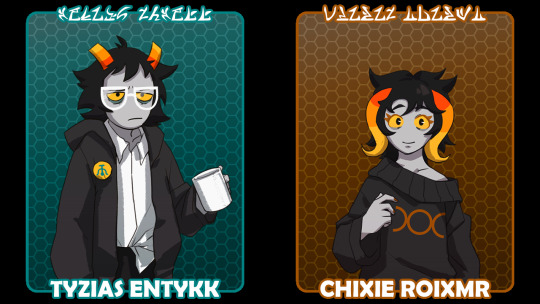
Tyzias and Chixie. Tyzias looks like a programmer (though so far ‘computer nerd’ stereotypes tend to be yellow bloods, not teal), while Chixie... not sure what her deal’s gonna be! (Watch as I get everything wrong again.) Not sure if Tyzias’s horns are naturally like that or if they’ve been cut.
Tyzias
Tyzias is written by Lalo Hunt, who has previously written Tagora - clearly someone with a thing for teals!
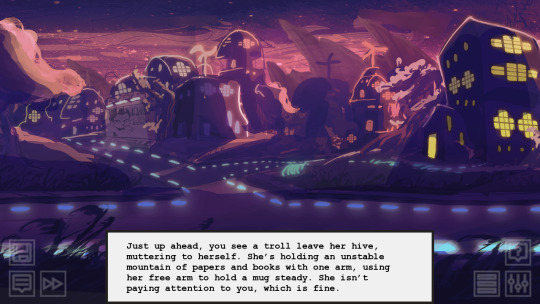
Tyzias’s theme kicks in almost immediately. As now seems to be standard for tealbloods, we have harpsichords.
Our narrator is starting to get the slightest hint of like... restraint about the ‘MUST BEFRIEND EVERYONE THAT MOVES’ attitude. They actually don’t immediately go for like... jumping on Tyzias and trying to forcibly befriend her, but walk past... unfortunately she falls over. Impressively, she keeps her coffee cup level despite tripping over a rock.
Her typing quirk seems to be using lowercase letters, and repeating all uses of ‘w’ and ‘m’ four times. OK...
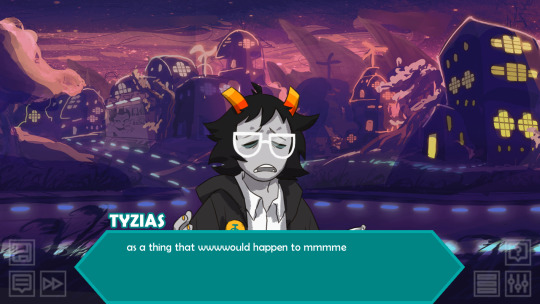
The narrator convinces themselves that this is the prelude to some kind of teen romance where they’re the cool person who helps the fallen nerd. Uh huh. Our extremely cool protagonist.
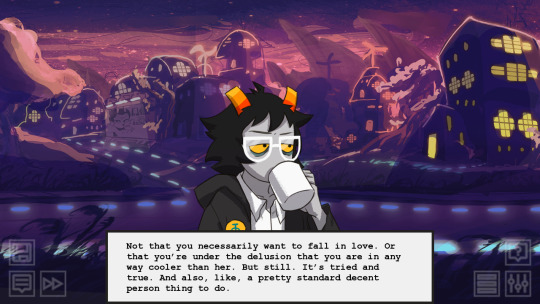
So we start helping her out and find she’s a lawyer. That’s like... every tealblood we’ve met now? Canon said they were also civil servants but OK, I guess everyone just loves Terezi. (To be fair, I also love Terezi.)
We get our first choice, prompted by the realisation that she’s a lawyer:
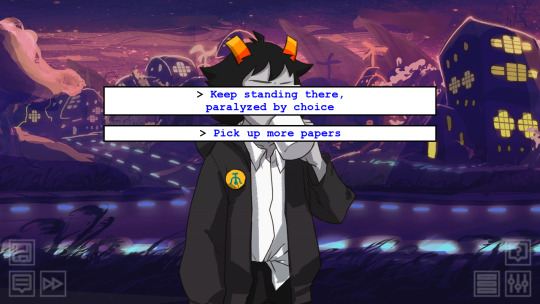
Tradition dictates that one of these is an instant-death option. I can’t help but expect that the ‘obvious’ choice, picking up more papers, will be the one that fucks us over.
...maybe not. We carry on going, and find out our dear friend Tagora has been talking about us, and he may be in a ‘group project’ with Tyzias here...
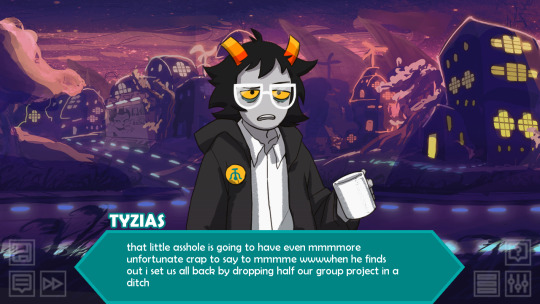
We spend some more time trying to get her papers together, against the best efforts of the wind. The narration emphasises just how tired Tyzias looks - quite the contrast from Tagora.
In fact, that carries us all the way up to the second choice. We can either suggest a breather, or trying to sort it somewhere else.
Let’s take a breather.
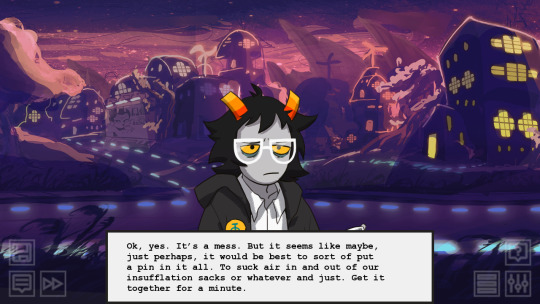
Insufflation sacks! Guessing that’s a narrator improvisation rather than actual Troll terms.
We take her to a ruined tower, which the narrator has apparently been spending time in when they’re not busily befriending every troll who survives long enough to get a portrait. This merits a new background.
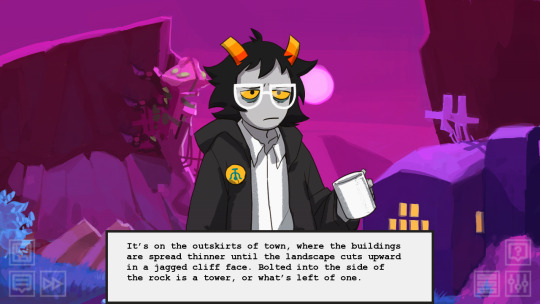
She’s not hugely impressed by the idea of urbex (unrelatable tbh, if an alien appeared and wanted to take me to do urbex i would be there in a heartbeat), but the narrator actually shows some backbone and encourages her to climb up anyway. (I guess our broken ribs have healed some by now? I can’t honestly remember if we’ve fixed them all in this particular series of branches...)
Tyzias explains to us a bit about the political order on Alternia - that the Condesce rules, and this used to be a watchtower before she got higher-tech drones and so on. She doesn’t seem entirely happy about ‘her imperial bitchiness’...
We reminder that she’s teal, which uh... gee, narrator.
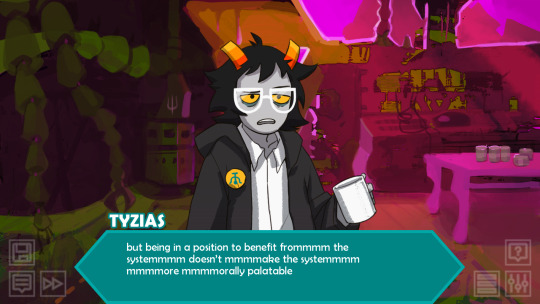
Looks like we’ve found an Actual Decent Person troll! Wow.
She’s particularly fed up with her whole role in the system, which she describes as the work to maintain suffering - because everyone is guilty, no matter what, and trials are just a formality.
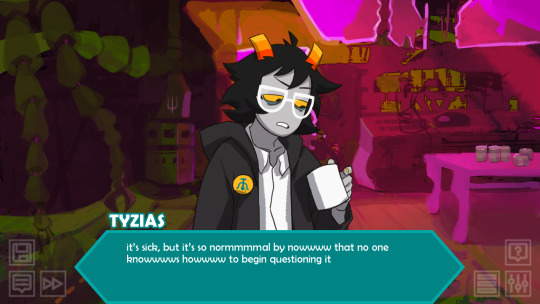
Depressed, exhausted, horrified by her society... this troll is pretty relatable after all actually.
We ask about political parties (lol, good luck) and rebellious movements. She fills us in a bit on what we know to be the Signless/Sufferer’s rebellious movement, and the subsequent rebellion by the Summoner (which someone might have written up an infographic about for you... pssst).
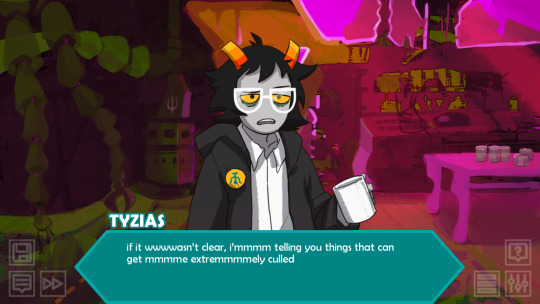
Tyzias keeps going in a spirit of ‘ah, fuck it’. And gets more confident as she does...
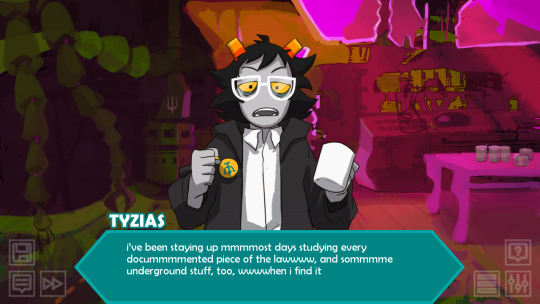
Sounds like she’s got some kind of radical law project in mind. To me, the idea of changing the system within is like... kinda obviously never gonna achieve the substantial change needed, but I can totally respect it as a harm reduction measure.
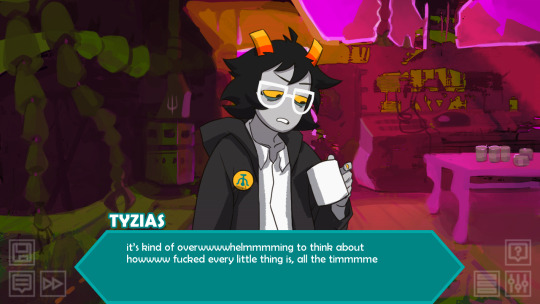
this screenshot is going on my main
We get to telling her a bit about Earth. The protagonist tries to, well...
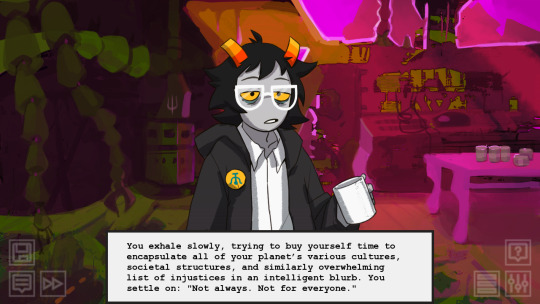
That’s a way to put it lol.
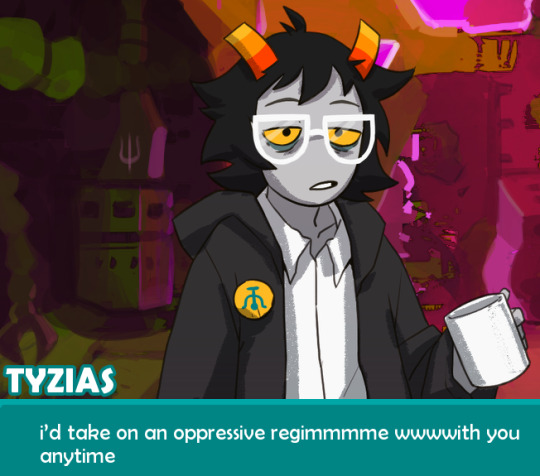
How romantic!
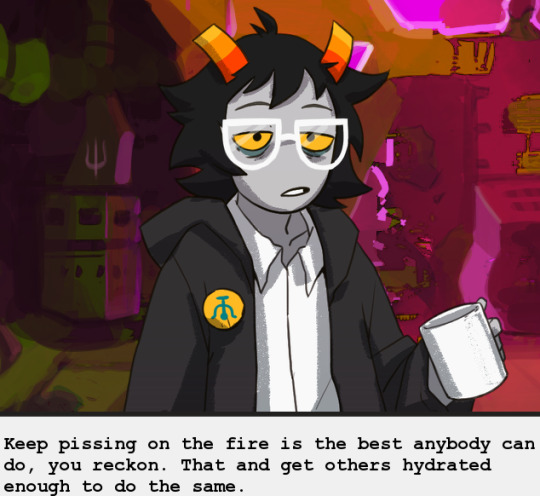
Damn, this episode’s a bit real lol
As a final kicker we learn that what she’s been drinking out of her mug is... just water. She’s putting on an act to give people a reason why she seems so depressed and tired all the time.
And with that, she takes a nap, and we get another friend.
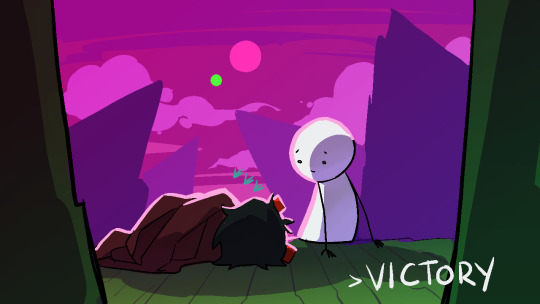
D’aww.
Unfortunately, we lucked onto the best outcome on our first playthrough, so that means it’s all downhill from here. Which is a shame because I care about this troll.
First, for our instant death option, let’s stand around paralysed by the image of a gavel instead of helping with her papers. So rather than the bait-and-switch I was expecting, this plays out in the way most people would expect: she tells you to stop trying to ‘help’.
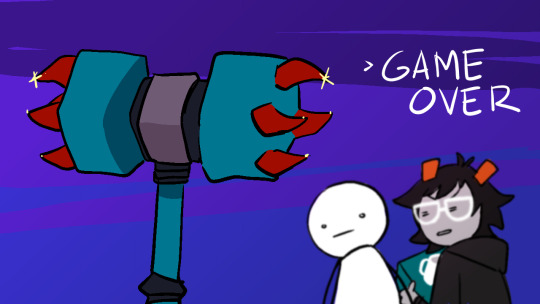
I thought it was a picture of a gavel, not an actual gavel! But OK. [treacheryofimages.jpg]
Now let’s try the other option: helping her organise her papers someplace else instead of trying to give her a break.
Unfortunately, in the process of sorting her papers, we lose one. I’m sure that’s not a Chekhov’s gun or anything.
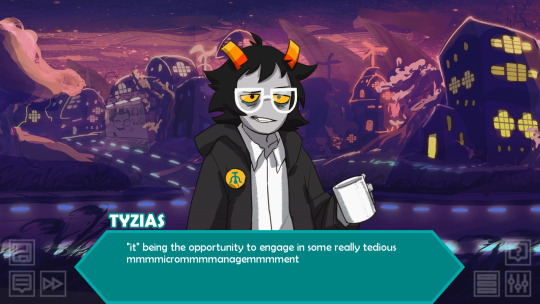
This is a Very Good typing quirk.
The bookhive (library) turns out to have, what else, hexagonal shelves.
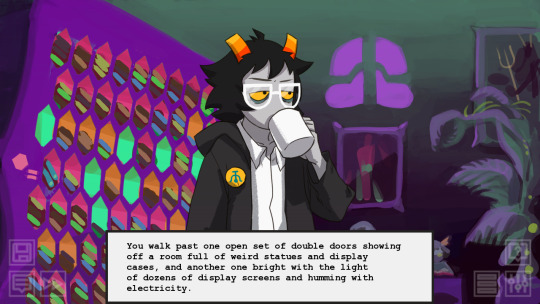
That’s cute but damn, not gonna be efficient...
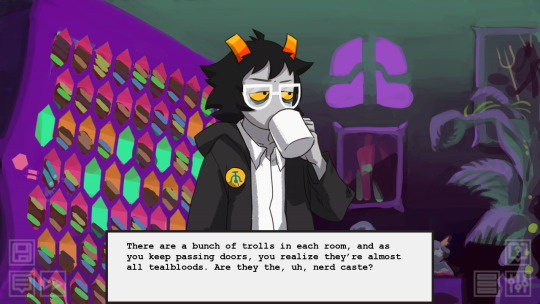
This narration turns out to be read out loud. ‘wwwwowwww, harsh’ says Tyzias, but says that’s basically true. (I would motion that nearly every caste in Homestuck, at least going by the characters we meet, is a nerd caste...)
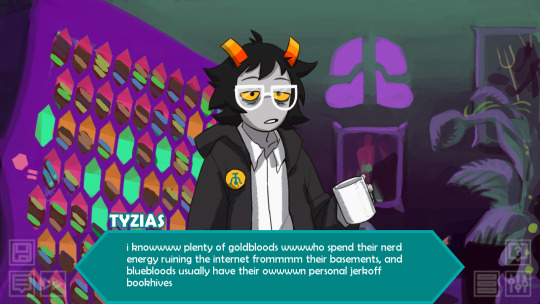
Tyzias mentions a few. Interestingly she says ‘goldbloods’ rather than ‘yellowbloods’.
We learn a bit about her legislacerator training project.
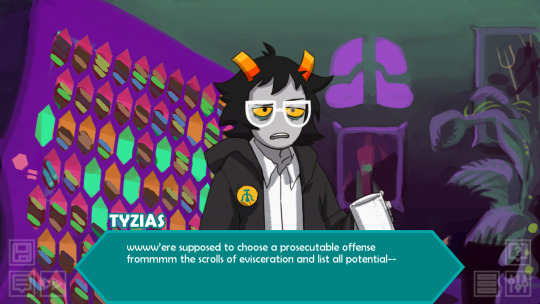
The narrator doesn’t want to hear this, but I’m kind of amused by the ideas of ‘scrolls of evisceration’. On Alternia, they know all to well that the ‘law’ is just a way of describing the ostensible legitimising limits to violence.
Tyzias mentions the difficulty of finding scrolls that haven’t ‘been scrubbed nice and fuchsia’. Which suggests that the Condesce, or another fuchsia-blood has been fiddling with the law?

The narration draws attention to some of the recurring tropes. But to be fair, we’ve only actually had to fight a highblood one time.
But no, it’s time for more interactions between our friends! Hooray!
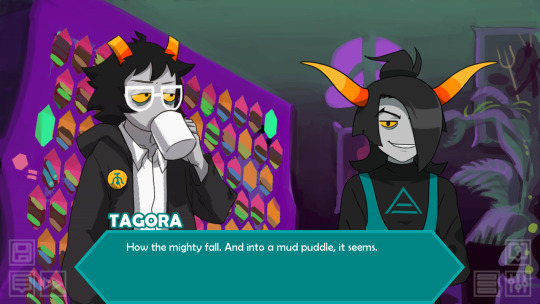
Are we still wearing his bathrobe?
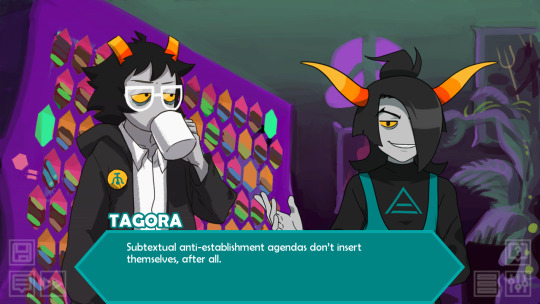
The guy seems to know a bit about what Tyzias is up to. Uh-oh.
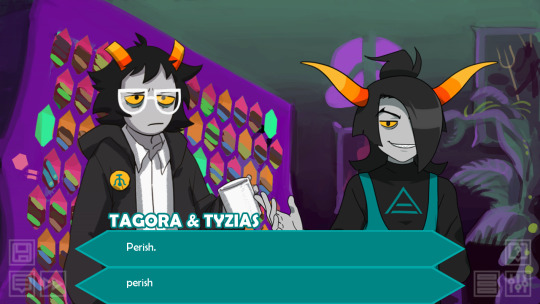
I’m so glad our friends get along so well!
Anyway after Tagora pisses off, we get back to working. And that’s when the missing page comes up.
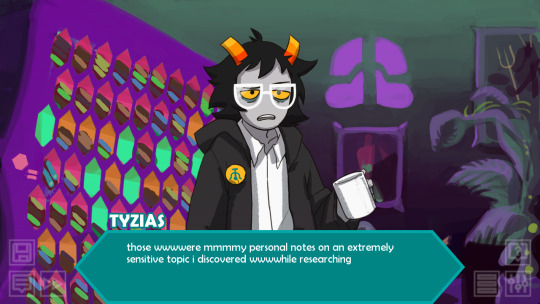
Figures. We’re in the shit.
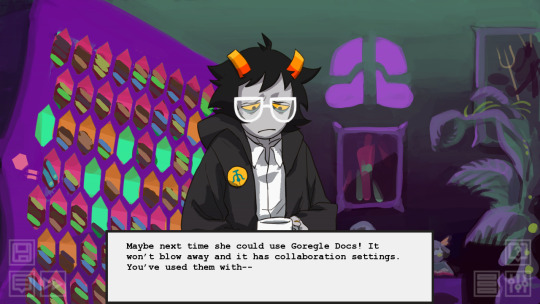
Inexplicable product placement. This, of course, leads to a pun: ‘goregle docs’. But of course, that is monitored by the Condesce.
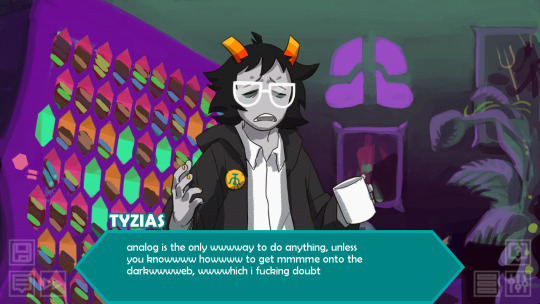
It’s actually quit easy to get onto at least some parts of the darkweb. There’s pages on the normal web which list the .onion addresses of various TOR hidden services. It’s pretty fascinating to have a look around at what’s up for sale for the kind of nerd who actually owns a bitcoin wallet.
Anyway, losing the page scuppers our friendship. She goes to retrace her steps - without us.
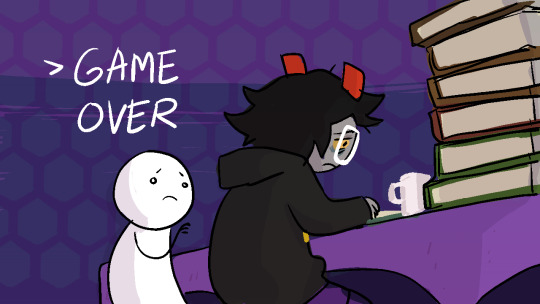
Anyway that was neat. Total shock: Bryn finds the exhausted, depressed nerd with radical politics relatable?
Chixie
Chixie’s route is by the ever-prolific Aysha U. Farah.
So what’s the premise for Chixie? Well, it seems to be fashion.
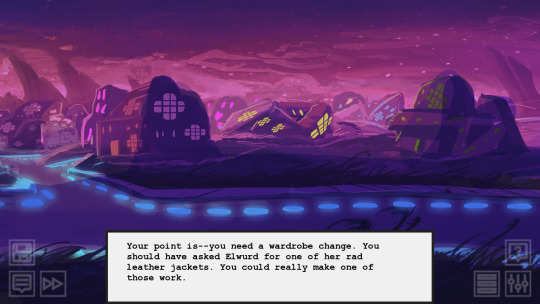
I guess we are still in a bathrobe after all. Also... I would quite like to see the protagonist in one of Elwurd’s jackets. They’d look ridiculous, but it would be cute.
Anyway, we could always go back to our highly fashionable friend Cirava, but I guess our protagonist has other plans.
We seem to have found the ‘Alternian nightlife’. The protagonist briefly speculates whether it should be ‘daylife’ instead, but seemingly not. We pop round the back of a club, which merits a different take on the whole ‘back alley and dumpster’ setting!
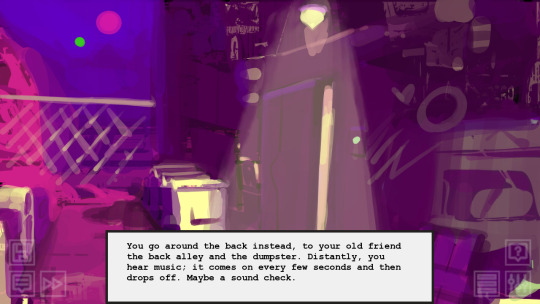
Chixie shows up, standing outside a door. The protagonist contemplates a disguise, and we get a joke about cosplayers...
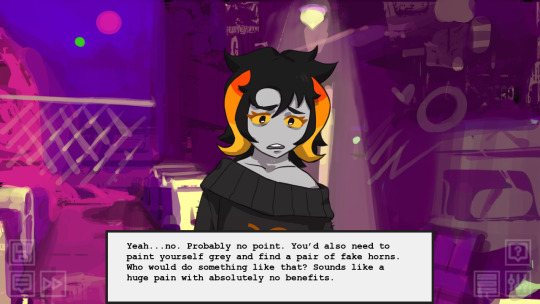
It seems like she’s maybe trying to convince the people behind the door she’s propped open to let her perform. We have the choice of grabbing the door or standing there like an asshole. Let’s grab the door, since that seems like the obvious option. Of course, you never know with this game if the ‘obvious’ choice will cause you to fuck up and accidentally murder someone.
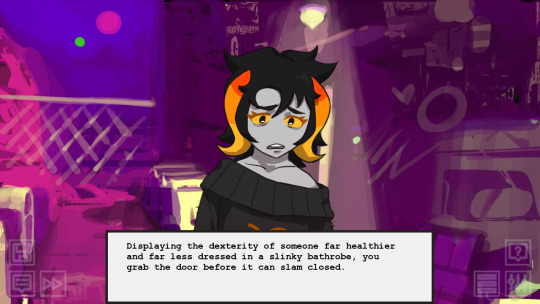
We are still wearing Tagora’s bathrobe. Haha.
So we let her in, and she says thank you... and goes inside, locking us out. Welp. Guess this was the instant death option lol.
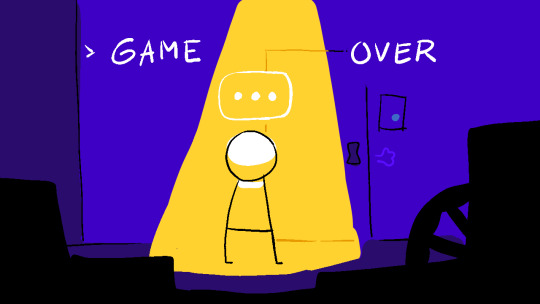
So now let’s try the ‘stand there like an asshole’ option.
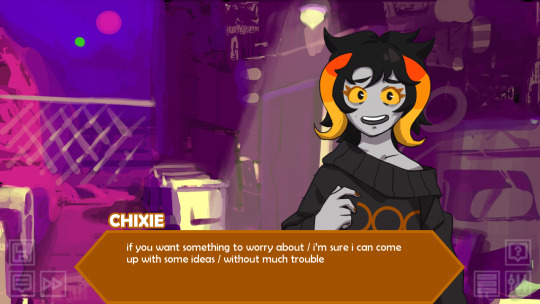
Her typing quirk is all-lower-case, and separating lines with slashes, much as you’d represent lines of a song. The narration describes her voice as musical.
It seems she is, in fact, a performer of some renown. She presumes we know who she is.
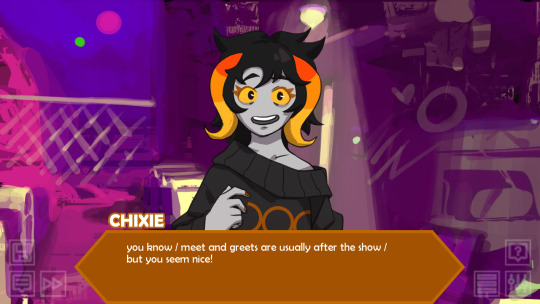
While we might be experts in moisturewave, whatever her genre is... not so much.
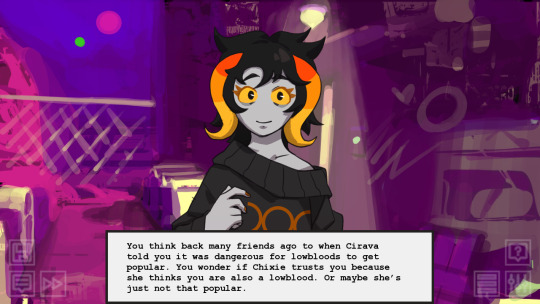
Speaking of moisturewave, Cirava gets a shout-out.
She uses ‘they’ pronouns for the protagonist, which is nice. Anyway, she takes us to visit her dressing room, and orders us to put on some actual clothes while she deals with harassment from someone who threw all her stuff out of the dressing room. Well, the ablutionrobe was nice while it lasted.
We end up wearing a dress.
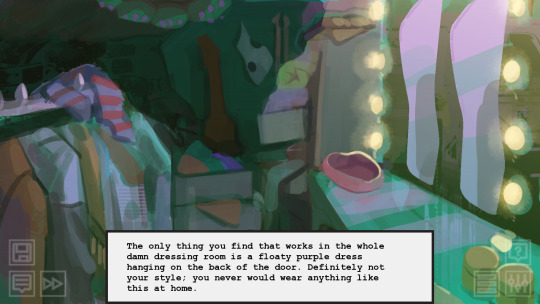
This might be a kind of ‘fuck you’ to the earlier narration which seemed to implicitly mark the protagonist as male. Or maybe that’s just wishful thinking. Anyway I’m all in favour of wearing a dress for the rest of friendsim.
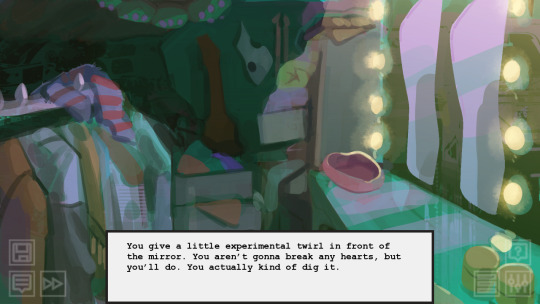
So does the protag! Nice :)
Anyway, we learn what’s up with Chixie. She’s been kicked off the programme because a band with a purpleblood drummer showed up at the last minute. Well, that’s bad enough, but oh god guess who shows up next...
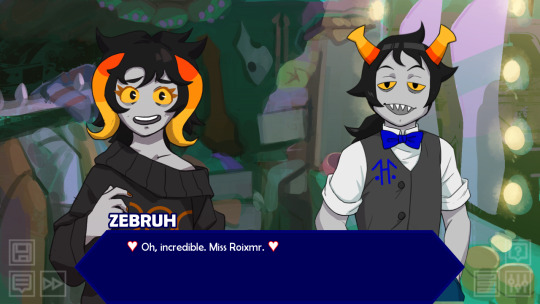
I literally shuddered.
Please can this be the arc where we absolutely beat the shit out of Zebruh? Please Aysha, I’m begging you.
The narrator determines that Zebruh is ‘not the kind of friend they want to hang out with’. Which is putting it mildly.
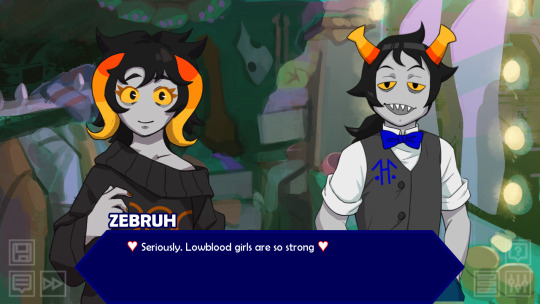
Zebruh, incidentally, has not changed one bit.
We get to our second choice.
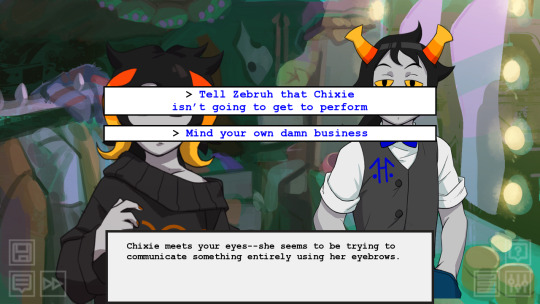
Honestly anyone’s guess which arc is gonna be the positive ending here. But let’s try exploiting our connections, as utterly odious as they may be.
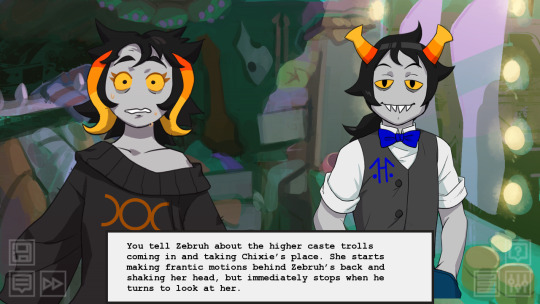
That was absolutely a mistake, lol.
He goes off to go and put her back on the programme. She’s like... for fuck’s sake, protagonist.
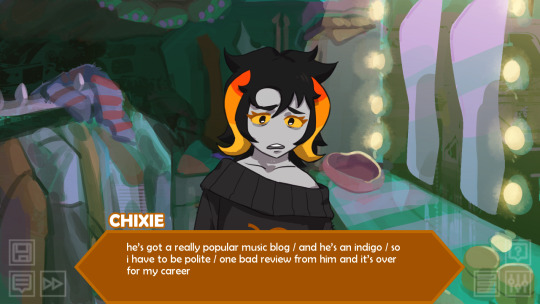
Anyway, what Zebruh does in response to our mentioning her missed performance is... literally buy the club out from under the owner, who’s ‘just’ a teal, and makes Chixie the headliner.
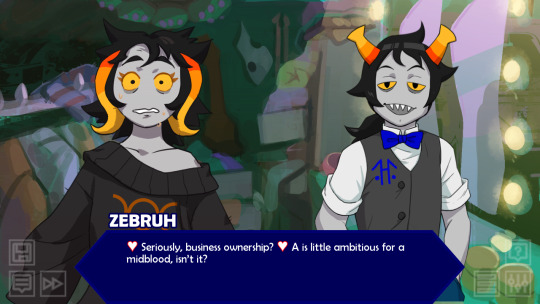
Of course, this is obviously him just trying to get sexual favours of some kind from someone who can’t say no. Like so obvious it probably doesn’t even need to be said.
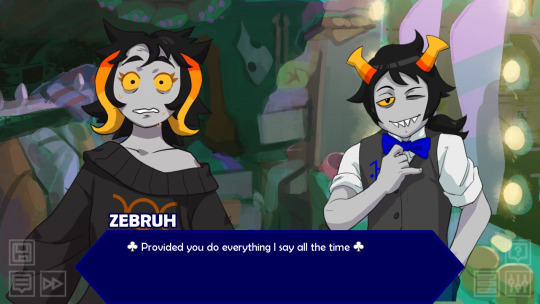
There we go. Can we please put this fucker through the mirror or something.
Chixie knows exactly what this is and she’s understandably not pleased. We’re gone.
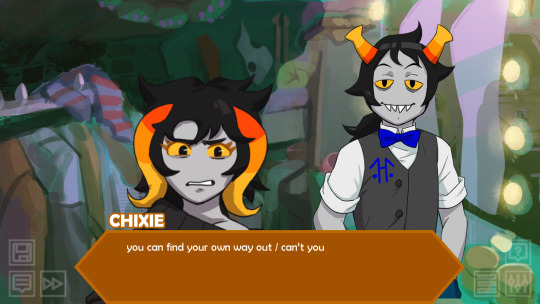
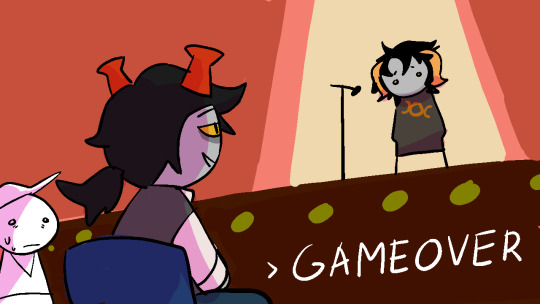
Yeah that’s like... pretty fucking deserved.
Now let’s try the route where we like... don’t do that horrific shit we just did. Hey, finishing on a happy ending... hopefully.
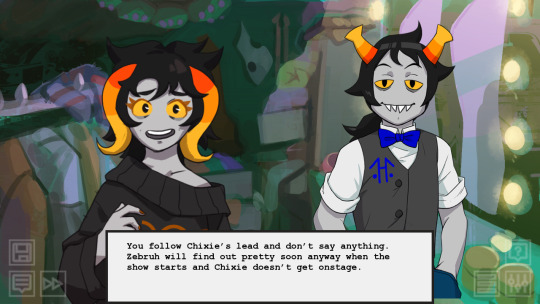
Please leave, Zebruh.
She seems to like... actually like us, which we haven’t really done anything to merit, but here we go. She even invites us to follow her chittr.
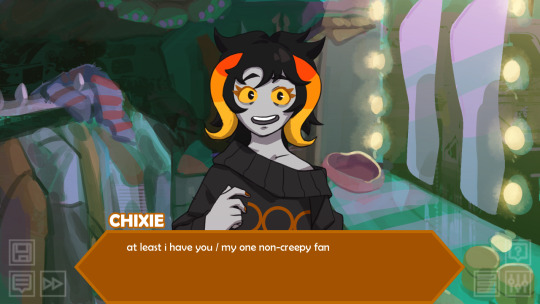
She admits we doesn’t know we aren’t creepy, and we assure her we’re less creepy than Zebruh, which like... low fucking bar!
Anyway, the band that scooped her comes on stage. The narrator muses on whether trolls are forced to dress in their blood colour by law or tradition.
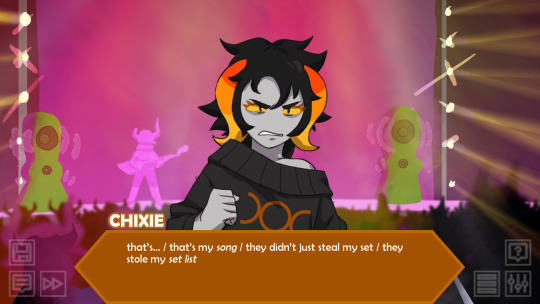
Wow, that is cruel.
She sings along...
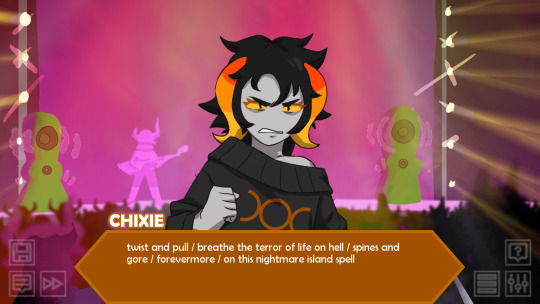
Apparently like... all troll lyrics are black metal lyrics?
We get a second branch! How extravagant.
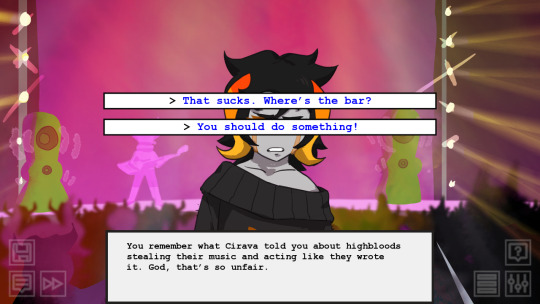
So, because I’m curious, let’s try ‘you should do something!’ I see this going badly, but let’s give it a shot.
She goes and puts on a phantom of the opera mask, and grabs a mic - which I guess is wired in and has its levels turned up? I don’t know...
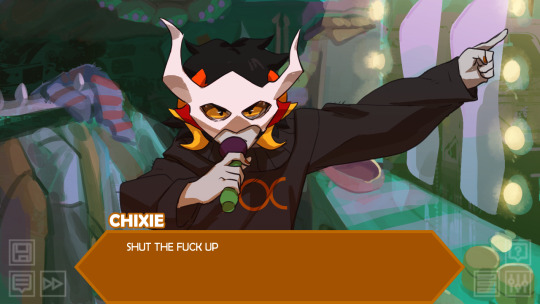
That is a raw look though.
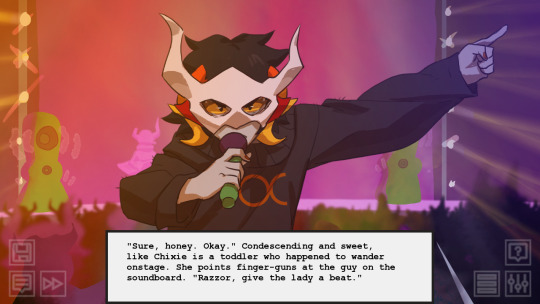
Time to interrupt their set. I am hype to see this, even though we’ll probably end up getting culled.
And she starts a friggin... rap battle?
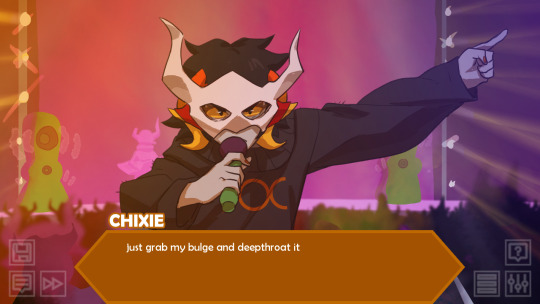
It’s a rap battle that’s also a limerick! Yeah. That’s something.
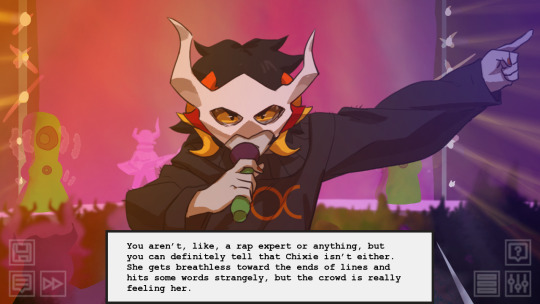


Anyway, Chixie does... very well at the whole rap battle thing. (Only the first five lines are a limerick). Makes me wish there was voice acting, if only for this bit!
I strongly suspect this is mostly a parody of like, existing rap songs, which I’m too culturally ignorant to see. All the same, the scene is well written and satisfying.
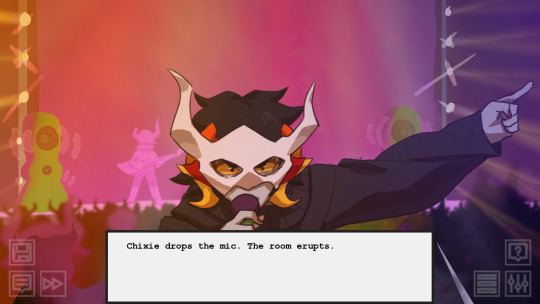
We escape outside, and Chixie freaks out a bit. And then gets simultaneously relieved and disappointed that she can’t be identified because of the mask. But, since she hasn’t changed clothes, someone catches her... and praises her performance.
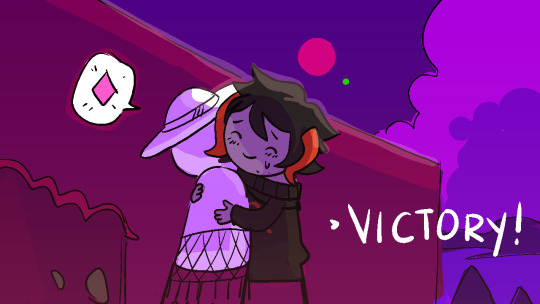
Ooh, diamonds huh?
So that was in fact the good outcome. Which means after that epic rap battle, we now have to see the branch where we go to a bar and get miserable. Yep.
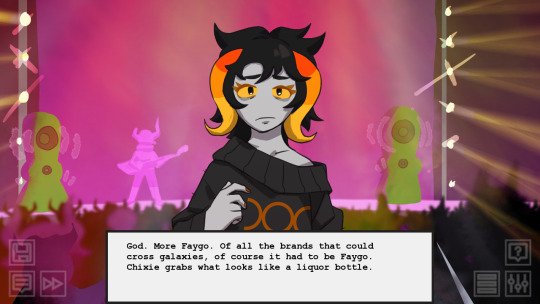
Of course, on Alternia, we don’t have alcohol... but Faygo.
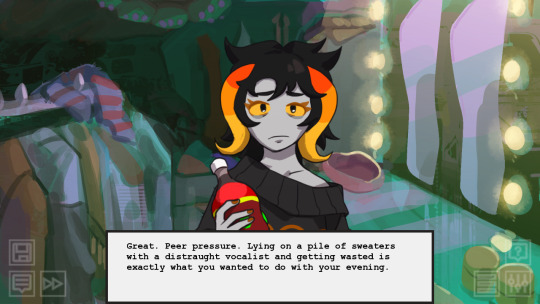
And it actually makes her drunk!
She speaks on matters of fame...
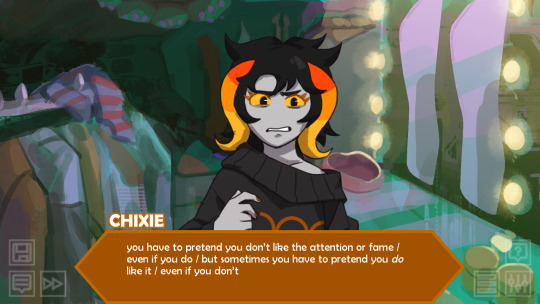
And of course, this is mediated by blood colour. Lowbloods must be hypervigilant, while highbloods will get praise regardless.
Again, the metaphor layer is paper thin here.
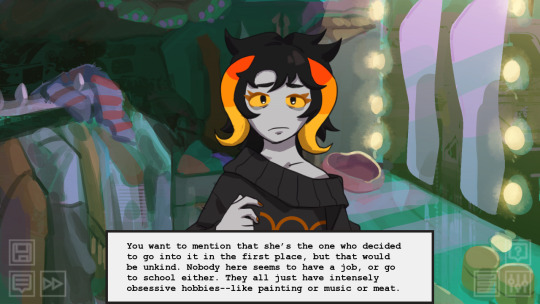
Come to think of it, nobody does seem to have a job in Alternia. It’s like... fully automated luxury imperialism.
Anyway Chixie passes out on the pile of clothes and we get a... well actually it’s given a ‘victory...?’ label, but it’s clearly less victory than the awesome rap battle.
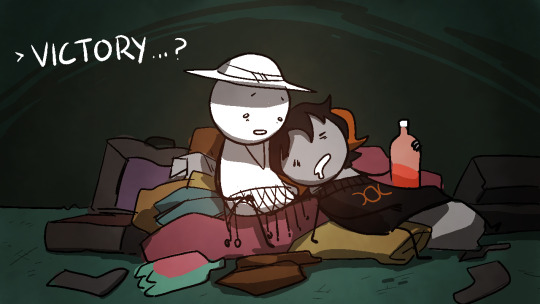
So yeah. That’s an outcome.
And there we go! That’s the end of the episode. I have a... perhaps unfair feeling that like... if Hussie was writing, this wouldn’t be nearly so on the nose about like, oppression. But who knows.
Fun episode I think. This game’s grown on me a lot now we’ve gotten used to the format. Or is it just that if you spend enough time with a massive sprawling multimedia webcomic, you get a little obsessed with it, even if it’s not actually... good?
9 notes
·
View notes
Note
Stans keep using the argument that "it's only fiction" when they can't give a retort to our points. Yet they actually prove themselves wrong at the same time, because they adapt every single view SJM portrays in her books. They've accepted that physically abusing someone in order to 'help' them, biting others without consent, slapping others out of anger, making out in public with no regard to the people around them etc. is totally fine and can be excuse at any time. Fiction influences people!
Yes! Media and storytelling have such an important influence on everyone across every culture, especially from a young age! It’s one thing to read or watch something and acknowledge all its issues while still loving it. It’s another to act like it’s perfect and say that you’re a better fan because you blindly love it. Alien and Fayre are blank slates for readers to project onto, with just the right amount of fake complexity to the world and plot. I think that’s why people are so quick to defend SJ/M. But it’s vital to recognize the power of fiction, for better and worse. I’ve seen SJ/M stans word-for-word say things “I don’t want to read about gay people lol” or “Well Nehemia had to die for Alien to become queen, it’s just a coincidence.” If you don’t want to read about gay people or you think that POC need to die for white characters, then what does that reflect about your worldview? SJ/M’s writing has directly enabled that thought process.
For some people, fiction is the only way they’ll encounter people different from them or be exposed to experiences that they may have in the future. That’s why the damage has been done already with characters like Rice and R.owan. I also used to let them slide because the narrative manipulates the reader into excusing them and romanticizing them, or thinking “It’s not as bad as Tom Lane.” It’s completely possible for people to read R.owan punching/biting Alien, or Rice breaking Fayre’s arm and tattooing her etc, and find this behavior sexy and intriguing. Then they might seek that out, excuse it, or treat their partners as such in real life. They might read SJ/M’s POC and LGBTQ stereotypes and think real POC and queer people are unrelatable and flat.
It’s so common to see characters like Row/Rice get excused and glorified in universe and in fandom. That’s why R/eyl0 has such a strong fandom despite the fact that F.innrey was clearly being set up and Kyle has committed mass murder, killed his father, and tried to kill Rey’s friends. All we can do is continue to spread awareness in the hope that stans will allow themselves to think critically and understand that SJ/M’s books are problematic, even if they do enjoy them.
62 notes
·
View notes
Text
The Good and Bad of Secret Crush On You (SCOY)
SPOILER WARNING. C/W: fatphobia, stalking.
Unlike most shows I've watched thus far, most of SCOY's highs and lows come in the form of its characters. Rather than specific concepts or events that evoke my love or disdain, each particular character leaves me with a certain feeling nudges me one way (this is a decent drama) or another (this is a bad drama). So, in contrast to my previous installments of The Good and Bad of... series, this one will examine each character and how they make the show better or worse, starting with:
The Good
Daisy. Loved that we got a canonically trans character who hadn't physically transitioned. It was awesome to see her story depicted on screen. My only critique is that they kind of sprang her character development on us out of nowhere.
Intouch. What an incredible character to add to a BL. I loved that at every point he affirmed Daisy and never seemed to overstep any boundaries.
Som. Girlie might as well be Yiwha's child. She is the realest friend out there and is always there for Daisy, Jao, and Toh. It's sad that she never really got the onscreen treatment she deserved but I just loved her presence and felt like she made every scene she was in a little bit better.
The Bad
Kong. Why even add this character? What was his purpose? His entire storyline was boring, somewhat predictable, and trite. We've seen it before and we've seen it better. The only good we got out of this was First.
Prao. Why, lord, why are we still doing the jealous/catty ex gf trope in 2022? Ging is so incredibly beautiful and had some moments of intrigue, it's just irritating how she got reduced down to a stereotype. What's even more is I feel like it wasn't even necessary. At no point in the story did I ever feel like Nuea wanted her and at no point did I feel like Toh actually saw her as competition. Toh was more concerned about Van Gogh (a phantom person he had never met and didn't even realize was himself) than he was about Prao. So, again I ask, what was her purpose?
Jao. I just...wow. The way they fumbled the bag with Jao is soul crushing. The sad part is, I liked Jao. I thought his storyline dealing with fatphobia would've been an intriguing one. But the writers had to go and screw him over by basically telling him "It's okay if you're chubby because one day you'll get skinny and everything will be fine." What kind of message is that? Don't get me wrong, there's nothing wrong with a person wanting to change their lifestyle. But in a story that's supposed to be showing a character gaining self-confidence, the problem comes in when instead of the motivation coming internally, it comes only from others. Plus, this storyline, much like Daisy's transitioning, seemingly came out of nowhere. But honestly what really gets me about Jao's character more than anything is how infantilized he is. Why does he whine all the time? Why is he always acting like anything he doesn't approve of is oh so scandalous? Despite being canonically allosexual, he treats anything involving sex like you would expect a really young person would rather than an adult. I don't necessarily even mind characters like this (I liked UWMA well enough despite Pharm basically being this same character), it's just that Jao is aggravating a lot of the time.
Toh. Making Toh a redeemable character is probably the worst decision the writers of this show could have ever made. Toh is the worst friend in BL. This man's chief concern is his collection. Even when his so-called best friend is going through things, he's usually the last to notice (as he's preoccupied with Nuea). The story NEVER establishers why he and Nuea even like each other in the first place. He's unrelatable and he's a criminal. But in the end he gets redeemed as if all his stalking and stealing had no impact on the people he stalked and stole from. The more BL I consume, the more tolerant I become of certain tropes, character traits, and even violence, etc., but only when it's done well/realistically. Toh's character traits are very unique but peoples' reactions to him are what I find unrealistic. I get why he feels he can only look but can't touch, but he takes it to the extreme and the fact that people just kind of excuse it just gets under my skin so much lol.
Okay so this one became a stream of consciousness (especially toward the end). I promise I liked many parts of the show but the characters were borderline insufferable much of the time and at a point it got kind of boring lmao
#secret crush on you scoy#billyseng nueatoh skyjao hengsurprise#intouchdaisy oppnutt#torsom looknam#thai bl boys love
1 note
·
View note